The Trilateral Shitpost Fire that was the 1980 GOP convention, part 1
On the long history of thinly veiled antisemitic conspiracy theories on the GOP's right edge
This multi-part series is focused on two amazing documents pertaining to the 1980 GOP convention that I found in Walter Huss’s archive, but before I share those with you (which I will do at the end of this post) I need to set the scene to explain why those documents are historically significant…so bear with me a bit.
These days we’ve gotten used to opening our media source of choice and asking “wait a minute, why the fuck are we talking about Democrats in non-existent pizza shop basements supposedly drinking adrenochrome harvested from babies, Barack Obama’s Kenyan birthplace, Critical Race Theory in middle schools, Dominion voting machines controlled from the grave by Hugo Chavez, Bill Gates’s microchips in our blood, George Soros’s plot to install one world government in the US, Covid vaccines making people suddenly die, gay frogs, etc. etc?” One of the defining features of our era is that the demise of media gatekeepers has created a situation in which our national conversation is being constantly bombarded with a surfeit of bullshit conspiracy theories. Only a fraction of our fellow citizens actually believe any of this stuff (I have to keep reminding myself that 85% of Americans have gotten at least one Covid shot), but nonetheless we find ourselves spending an inordinate amount of time talking about these crackpot theories if only to debunk them or ridicule them, which means there’s less time for talking about real things of much greater import, like climate change to take just one example. The fact that Twitter’s owner has a brain wormed fascination with such conspiratorial silliness and amplifies it on a daily basis doesn’t help matters. By “flooding the zone with shit” (as Steve Bannon once put it), far right anti-democratic actors seek not so much to convince people to believe in all of this conspiracist BS, but rather to get them to reflexively disbelieve anything established authorities in the media, the academy, or politics say. Fascist political cultures feed off epistemological environments in which people have come to think that “everything is possible and nothing is true.”1
Changes in communication technology have much to do with how we got here, but there’s more to the story. As we’ll see, far right anti-democratic actors flooding the zone with conspiratorial bullshit is a timeworn strategy for the US right that long predated the emergence of the internet. Learning more about how past activists have used conspiracy theories to push the political culture of the Republican Party rightward over the years may help us better understand how that dynamic is playing out today.
As the 1980 GOP primary began heating up, several mainstream news outlets noted the emergence of a relatively new object of conspiratorial obsession on the American right—the Trilateral Commission. Once the GOP primary became primarily a two man race between George HW Bush and Ronald Reagan, some of Reagan’s more populist and conspiracy-minded supporters began pushing the idea that Bush’s past membership in the Trilateral Commission rendered him suspect. The LA Times article from 13 February 1980 below is representative of how the mainstream press generally discussed this topic. Journalists and editors knew that the Trilateral Commission was not some nefarious front the international Communist conspiracy was using to impose one world government, so they rarely treated the accusation like something worth looking into. Rather, they tended to treat Trilateral talk as the latest manifestation of the usual political shenanigans that old school right wing papers like the Manchester Union Leader had engaged in for decades.
Los Angeles Times, 13 February 1980
Initially, George Bush tried to brush away the Trilateral Commission charges by saying he’d resigned from the innocuous group in 1978, but such disavowals did little to stem the flood of Trilateral Commission talk on the pro-Reagan right. After all, these were political operatives and ideologues doing this, not people with a genuine interest in gaining an accurate understanding of George Bush’s world view. Whether they were deluded true believers in this conspiracy theory or cynical propagandists who knew they were lying, the truth about the Trilateral Commission was irrelevant. All they knew is that when they started talking about it in terms that replicated time-tested antisemitic themes, a lot of primary voters started listening intently.
When Bush asked Reagan to slay this particular conspiratorial dragon, Reagan demurred. Reagan’s people knew it helped his campaign to have Bush linked to a shadowy cabal of internationalist bankers plotting to sabotage American sovereignty and install a one world government. Even though most people on Reagan’s team surely knew the charge was ludicrous, why go out of your way to quell a conspiracy theory about your opponent that was driving GOP primary voters away from him? In May 1980 the LA Times editorial board took some time to look into this Trilateral Commission silliness, shook their heads, and said “Come on, now.” We might append a silent but implied “are you fucking kidding me?” Ah, sweet summer children, if only they knew what was coming down the pike.
Note how the LA Times editorial page, like most mainstream outlets, did not devote much time or energy to figuring out where all of this Trilateral Commission nonsense was coming from, as if it was just part of the natural landscape. In hindsight, and this is what the document I found in Huss’s archive reveals, this trilateral shipost fire was set by a fairly small number of individuals and, thanks to the historical tailwinds of American populist antisemitism, spread like wildfire. But I’m getting ahead of myself.
The Des Moines Register was one of the few mainstream newspapers that tried to answer the question of where this Trilateral Commission conspiracy theory originated. Judging by the barrage of anti-trilateral commission letters to the editors of Iowa newspapers in 1979-80, the state’s rank-and-file voters seemed especially likely to have been exposed to and taken in by this theory. The Des Moines Register correctly identified the far right conspiracy rag, The Spotlight, as a likely suspect. Though most observers did not know it at the time, The Spotlight was the brainchild of Willis Carto, the secretive Nazi-sympathizer and Holocaust denier who ran the Liberty Lobby. What mainstream observers knew was that The Spotlight had a circulation of over 300,000 and that its radio show aired on almost 500 AM stations around the country. At the time, people who didn’t read The Spotlight or listen sympathetically to their radio shows most likely thought of it as akin to the National Enquirer in its, shall we say, epistemologically-challenged relationship to the truth. Sure, some kooks out there read it, but it was best just to ignore harmless and deluded people like that. The only problem with that approach was that The Spotlight had far more subscribers than the National Review, and their AM radio shows had far more reach than George Will’s erudite columns. Condescension toward the conspiracy kooks on the right edge of one’s political coalition, it turns out, is no substitute for an actual strategy focused on blunting their influence.
Des Moines Register, 27 April 1980
The letters to the editor sections of the nation’s newspapers in 1980 were suffused with angry anti-Bush letters citing The Spotlight as their source for their “information” about the nefarious Trilateral Commission. So far I’ve found only one lone voice of clarity and reason amongst those who wrote letters to the editor about the TC in 1980. Wayne Ditsworth, a high school senior in Cedar Rapids, IA who worked as a grocery clerk, decided to actually purchase and read The Spotlight, the source of all of this Trilateral talk he’d seen popping up in his local newspaper. After perusing The Spotlight, Ditsworth, an aspiring political science student, quickly and accurately identified the tabloid as the virulently antisemitic and racist, Nazi-friendly conspiracy rag that it was. Whereas almost all of the nation’s mainstream newspapers completely ignored The Spotlight or dismissed it as a laughing stock, Ditsworth, armed with only his powers of historically-informed critical reading, had the paper nailed dead to rights. Those thousands of Iowans who purchased and read The Spotlight were being taken for a ride by fascists using the oldest trick in the book—telling them that (((the elitists))) who controlled the media were hiding the real truth from you and only the good Christian Patriots at The Spotlight can help you resist being “brainwashed by the establishment.”
Cedar Rapids Gazette, 12 March 1980.
In contrast to the tone of condescending bemusement or frustrated befuddlement that marked most mainstream discussion of the Trilateral Commission conspiracy theory, events at the July 1980 GOP convention in Detroit demonstrated that this talking point was not just pouring out of the mouths of a few irrelevant kooks in the sticks. Rather, it had become woven into the fabric of mainstream Republican discourse. Many reports from that convention noted the ubiquitous chatter about the Trilateral Commission in the hotel lobbies. Reagan’s VP pick had not been announced before the convention and the more ultra-conservative elements in the GOP used the Trilateral Commission conspiracies as a way to argue against the selection of George HW Bush. The story below about Jesse Helms and Jerry Falwell’s efforts to resist a Bush VP nomination on the basis of his Trilateral Commission ties is indicative of how this one fairly insignificant line on Bush’s resume had come to stand in for something supposedly disqualifying about him, especially in the eyes of Republicans who identified as “Christians” and on the “more conservative” end of the political spectrum. [It’s also worth noting that Helms was the US Senator most closely allied with Carto’s Liberty Lobby and The Spotlight. He was one of the few sitting Senators who The Spotlight consistently praised.]
In hindsight, it’s blindingly obvious that the whole Trilateral Commission conspiracy theory stank of antisemitism, but I could not find a single newspaper article from 1980 that used the word “antisemitism” in reference to the Trilateral commission lunacy. Columnist Richard Reeves stands out as the journalist who came closest to stating the issue clearly, and even he refrained from using the word “antisemitism.” Reeves probably felt it would be taking things too far to lob charges of widespread antisemitism at the GOP convention, so he simply referenced The Protocols of the Elders of Zion (a hoax text many today have become familiar with, but which would have been a fairly obscure reference in 1980) and referenced the “burning crosses” of the first KKK from the 1870s. When Reeves sought to make sense of the many GOP delegates who earnestly spoke to him of the Trilateral Commission, his mind immediately went to Richard Hofstadter’s theories about “the paranoid style of American politics.” This was not entirely off base, but it’s notable that he didn’t seem to ask which currently living “populists” were responsible for the profusion of Trilateral Commission talk he encountered.
Wichita Falls Record News 31 July 1980.
One line particularly stands out to me from this column: “Reagan seems to have carefully distanced himself from this particular strain of U.S. conservatism. But he cannot control it, and it will outlive him.” Some fairly prescient words, in hindsight.
Two of the right wing evangelicals obsessed with antisemitic conspiracy theories that Reeves might have spoken with in Detroit were enthusiastic Reagan delegates from Oregon and avid readers of The Spotlight, Walter and Rosalie Huss. The Huss’s had long admired Reagan and had supported him for the 1976 GOP nomination over Gerald Ford. Indeed, even back in 1968 Huss wanted Reagan to get the GOP nomination, and when that didn’t pan out he threw his weight behind a candidate for President who he regarded as a close second to Reagan, George Wallace. Walter Huss had met Reagan personally a few times and had even shared a stage with him at an Oregon Truckers’ convention way back in 1961. In Huss’s mind, he and Reagan had long been co-workers in the same political project and he was thrilled to help get him elected President in 1980 and 1984, even though Huss harbored a few concerns about the east coast establishment “internationalists” and “secularists” in the Republican coalition who sought to exert influence over his favored candidate.
A photo of Rosalie Huss and Ronald Reagan at the 1976 GOP convention in Kansas City, MO. [Walter Huss Papers, University of Oregon, Box 16.]
Walter or Rosalie Huss’s delegate tag from the 1976 Republican convention preserved in Huss’s “Reagan” file. [Walter Huss Papers, University of Oregon, Box 16.]
Though the rosy glow of nostalgia has made many look back to the Reagan era as a time of calm consensus amongst American conservatives, the grassroots far right insurgency of which Huss was a part was very much in full swing and causing all sorts of headaches for establishment Republicans. Remember that Huss had ridden the wave of that insurgency into the OR GOP chairmanship in 1978, only to be ignominiously booted out of that role in the summer of 1979. Smarting from that defeat, Rosalie Huss decided to mount a primary challenge from the right to moderate Republican Senator Bob Packwood in the 1980 election cycle. She didn’t come close to defeating him, but her campaign activated the same sorts of ultra conservative Republicans who had supported her husband Walter. [In 1986 an inheritor to that far right Christian constituency, Joe Lutz, would mount a similar primary challenge to Packwood and get a respectable 42% of the vote…an ominous sign for the future of GOP moderates in Oregon.]
This ongoing turmoil within the OR GOP (a dynamic that was replicated in many other states) explains why the delegation of second-stringers they sent to Detroit consisted of almost no elected Republicans and few of the old line moderates who had dominated the party before Huss won the chairmanship in 1978. Just as the grassroots far right insurgency of the 1970s buoyed Reagan’s campaign for the GOP nomination in 1980, his victory was a boon for those grassroots outsiders within their own state parties, and was experienced as a set back for those who wanted to see the GOP chart a more moderate course into the future.
Oregonian, 3 July 1980.
The fact that Huss attended the 1980 convention as an official delegate is quite remarkable. His time as OR GOP chairman had been disastrous and divisive. He’d been booted out of office by the executive committee of the party (including some who had previously supported him) and his time in the spotlight meant that more people had closer familiarity with how much of an extremist he really was. But neither Walter nor Rosalie Huss (who had filled the knick-knack shelves of their modest Portland home with her huge collection of ceramic elephants) was about to give up on the Republican Party. As we see in this 1980 solicitation letter they sent out to the members of Help America, the organization they created after Huss was ousted as GOP chair, Walter and Rosalie were willing to spend their own money to attend Reagan’s coronation. In this solicitation they also signaled their concern about who Reagan would pick as his VP. Although they don’t say it explicitly, their readers would have known that George Bush, the Trilateralist, must be stopped.
And now, at last, we get to those two amazing documents I teased you with at the beginning of this post. Huss put them in his “Convention” folder and they are pretty much the only material he seems to have saved from that convention. I’m fairly certain that the first one is written by Anthony Hilder and the second one is by Gary Arnold (much more on both of these right wing conspiracy mongers, active from the 1960s into the 2010s, in the next installment). I have not been able to locate other copies of these documents anywhere else, though perhaps they exist buried in some archive somewhere, and I have not yet found any other historians who have written about them. I describe them as “amazing” because they offer us a close-up view of the handful of far right activists whose actions made “the Trilateral Commission” such a prominent topic of conversation at the 1980 GOP convention.
.
Quite the dramatic tale of a small cadre of brave truth tellers duking it out with evildoers in the lion’s den of Detroit’s Joe Louis Arena, eh? I love the detail where the Smithsonian people ask for one of their tabloids so that it can be placed into the nation’s permanent historical record. And the dramatic account of their 56 hour drive from California to Michigan, gazing down at their trilateral fliers for inspiration to keep driving on through the desert heat, sleep deprived and un-showered, is something else. It’s probably safe to assume that this document contains some exaggerations and possibly some outright fabrications (like that Smithsonian story, perhaps?), but the general story they tell and much of the detail checks out with other accounts of the 1980 convention I’ve read. I’ve also found this early 2010’s video where we get an account of these actions from one of the people involved with this 1980 “power project,” Gary Richard Arnold. It’s fairly consistent with what appears in that document, though his disdain for Reagan is far more front and center in this video.
One thing I hope to learn is who this document was written for and given out to. The handwritten corrections on it would suggest that this was one of very few copies of this text. Huss came into contact with Gary Arnold in the summer of 1980 when Huss was trying to set up a multi-level marketing health food business in Los Angeles and when Arnold was running for county supervisor on a characteristically nutty platform that I would guess Huss largely agreed with. I would not be surprised if Arnold and Huss traveled in many of the pro-Reagan, far right circles in the Los Angeles area in 1980 and thus thought of themselves as engaged in a common political project. That said, I’ve found no correspondence between Arnold and Huss, and no other evidence of their connections with one another beyond what you see here.
Several surprising things stand out to me from those two reports about the 1980 convention in Huss’s papers. First is the assistance these fringe chaos agents got from well-connected people in the GOP, like “Mr. Conservative” George Metusic of Michigan and his friend, State Senator Jack Welborn, the chair of Reagan’s 1976 campaign in Michigan. Likewise, Jack Kemp was a fairly well-respected figure in the GOP at the time. Did Kemp know of and approve all of the assistance these conspiracy theorists got from his team? Did he know of and approve of them dropping a banner that read “NO TRILATERALISTS…WE WANT KEMP FOR VP” while he delivered his address to the convention? Even though these guys had already decided that Reagan was basically a commie globalist—that’s how fringe they were in 1980—they still seemed to have connections to important Republicans who were willing to give them assistance. And more importantly, they succeeded wildly in making their Trilateral Commission conspiracy theory a frequent topic of conversation at the GOP’s premier event of 1980.
Another detail that caught my eye was Gary Allen’s interest in and support for their efforts. Allen, a Bircher, was a bit like the Alex Jones of his time. In fact, it was a copy of Allen’s book that sat on Jones’s father’s bookshelf in the 1980s that Jones credits with his “political enlightenment” as a youth. I remember being shocked to see Alex Jones strolling in to the 2016 GOP convention as a credentialed guest, but had I known about Gary Allen’s presence at the 1980 convention I would have found that less surprising.
Another detail that comes out in that paragraph about Gary Allen is that his son helped disseminate those Trilateral Commission fliers to other members of the press. One of Allen’s four children, who would have been 16 years old in 1980, was Michael Allen. He might be familiar to you as the founder of Politico’s playbook that was very influential in the Obama era. He then co-found Axios after he left Politico.
Ok, I’ll leave it there for now. In the next installment I will have much more to say about the machinations that led up to this dramatic moment at the 1980 GOP convention, but I think you get the idea by now that this document helps us see how a relatively small band of right wing activists, with an assist from some friendly folks with pull in the Michigan and national GOP as well as the press corps, were able to push a 100% bullshit conspiracy about the Trilateral Commission on to the national political agenda. As Nikki Hemmer shows in her book Partisans, the genealogy of today’s MAGA movement traces back to these anti-Bush conservatives inside the GOP, the sort of people who regarded GHWB as a sell-out RINO with suspicious ties to the globalists. People like Ron Paul, David Duke, and Pat Buchanan would masterfully draw on these simmering frustrations and resentments inside the conservative movement to fuel their own political ambitions. It should come as no surprise to you to learn that Walter Huss was an avid fan of Paul, Duke, and Buchanan—the benefactors and amplifiers of the conspiratorial political culture powered by 1980’s Trilateral Shitpost Fire.
Programming note: Tomorrow (Tuesday) night at 6pm Pacific time, Thomas Zimmer and I will be hosting a zoom conversation/Q&A about Ron DeSantis’s 2010 book Dreams from Our Founding Fathers. I’m sure our conversation will touch on other DeSantis-related issues as well. The conversation is open to my paid subscribers (who will get a zoom invite in their email tomorrow morning), but if you’re not on that list and want to attend, just email me at scotlar@willamette.edu and I can send you a link.
This oft-cited quote is from Hannah Arendt’s classic work, The Origins of Totalitarianism.

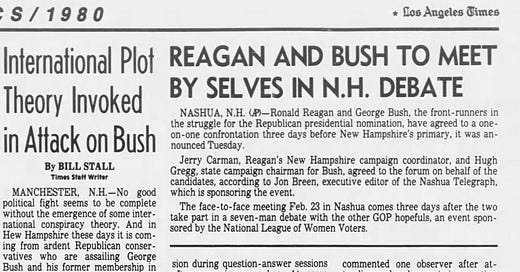



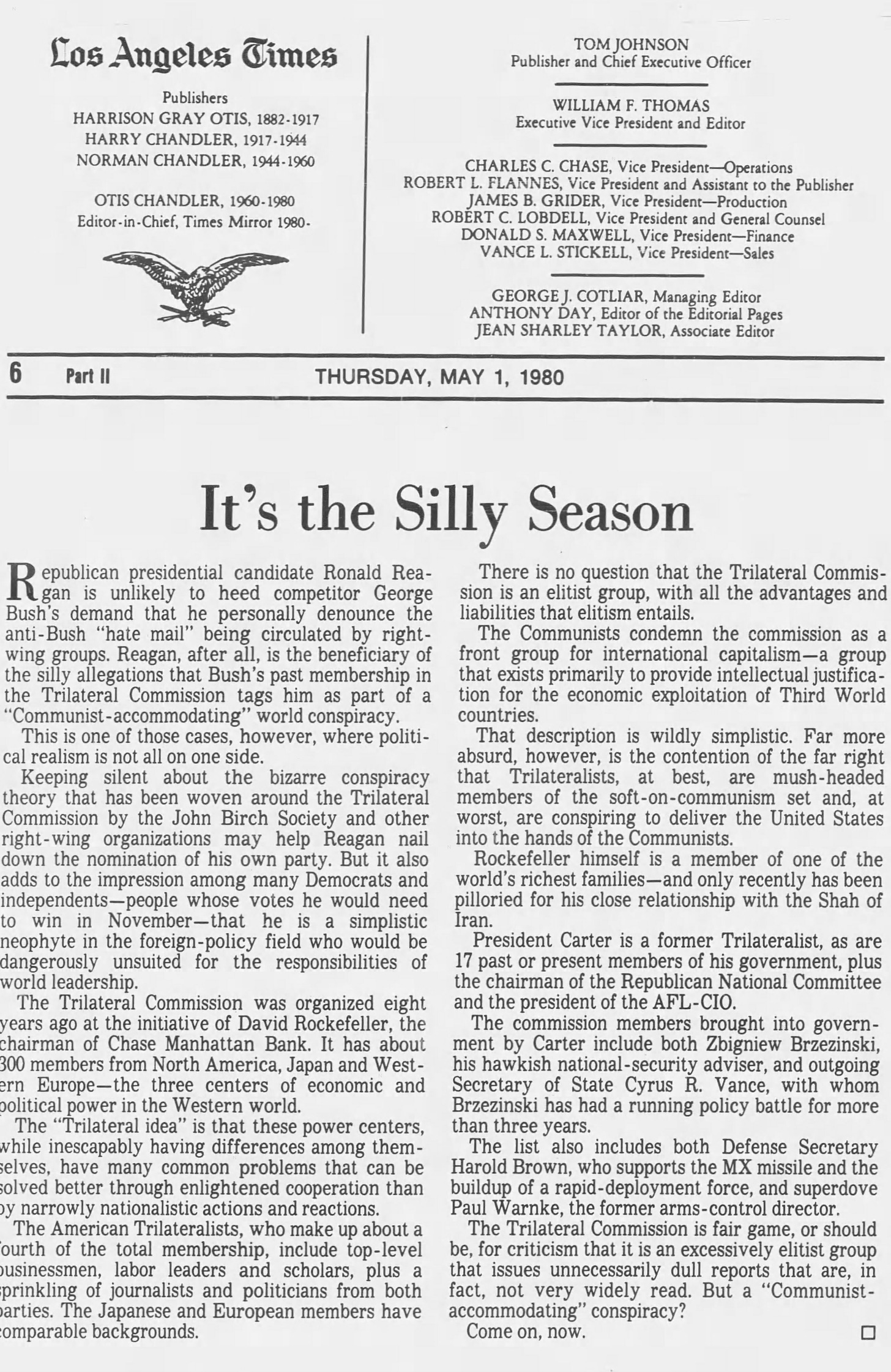
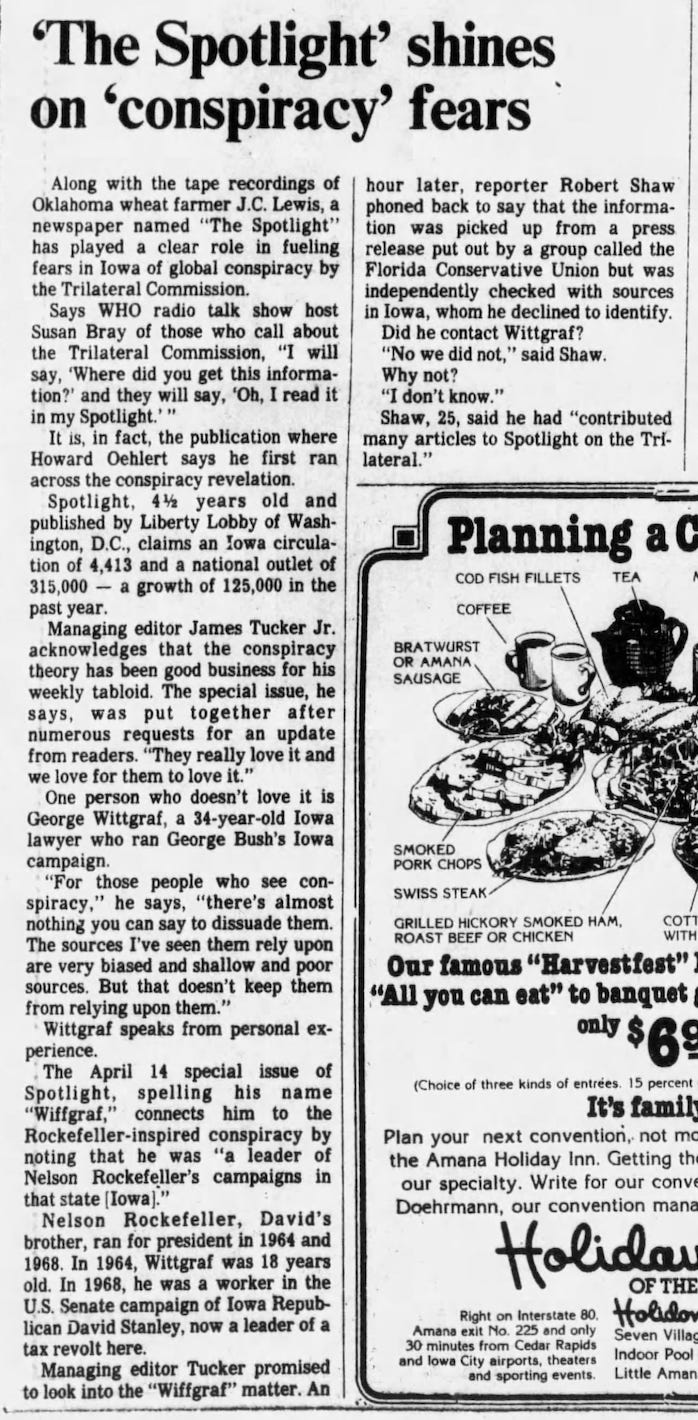
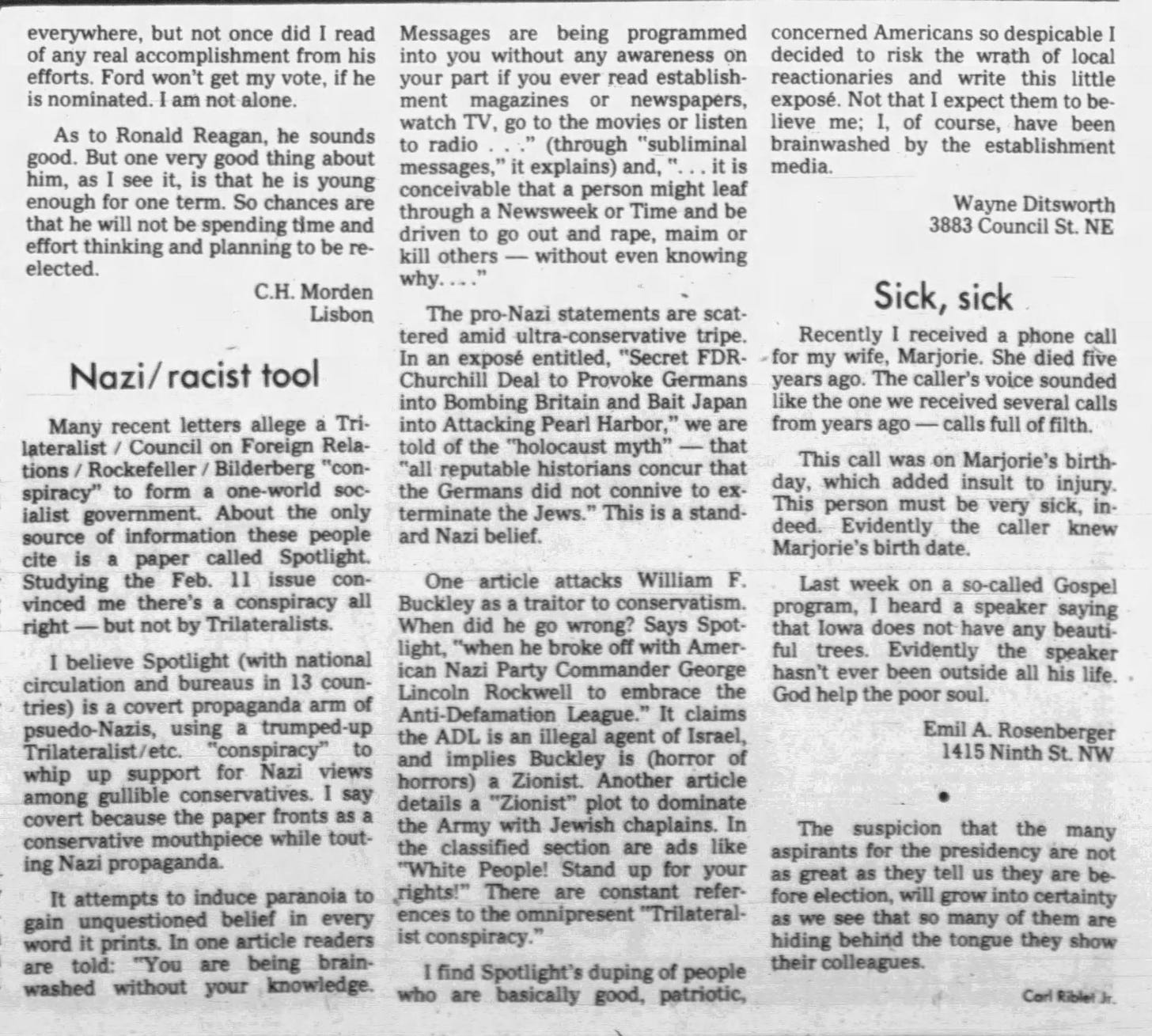

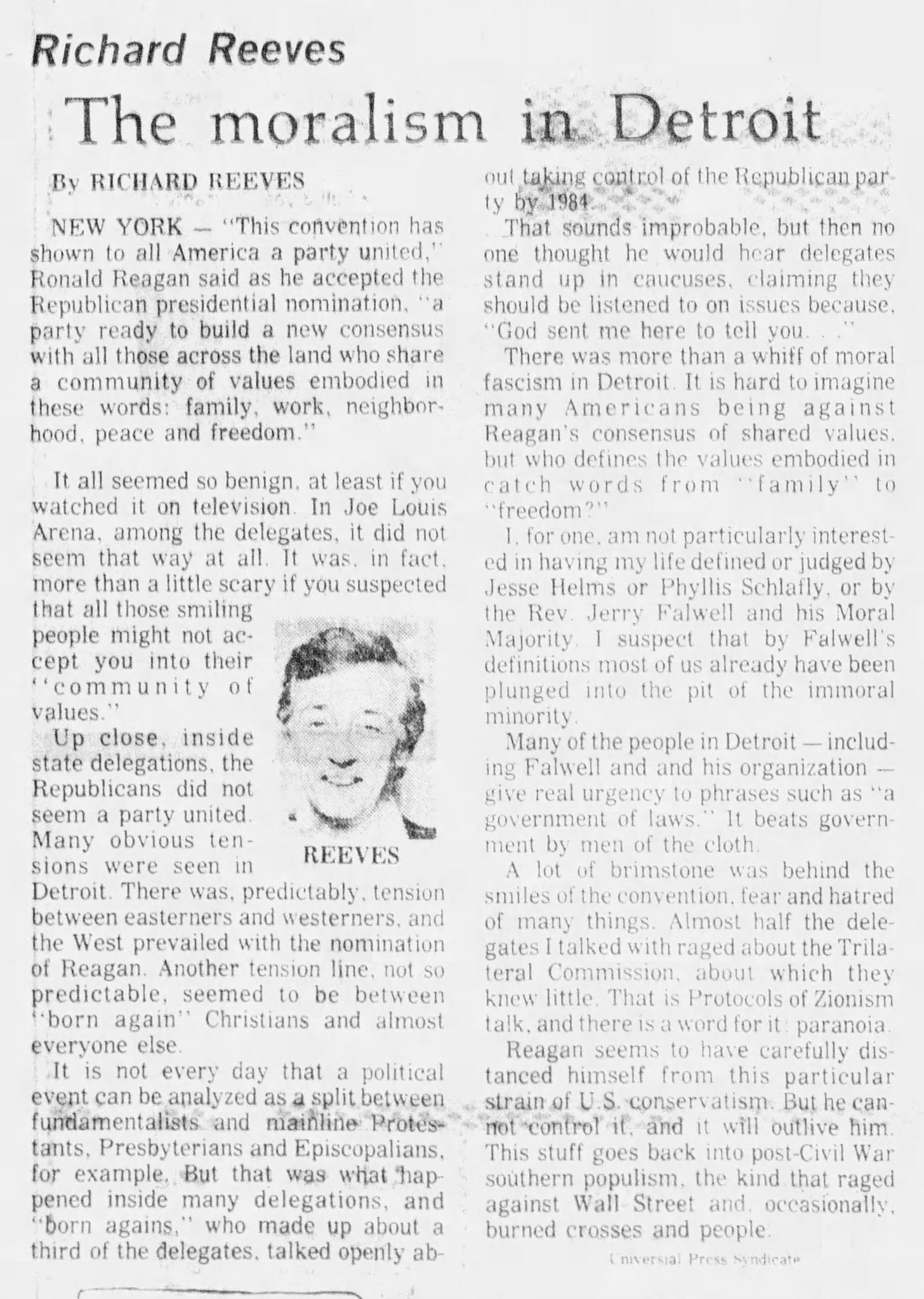
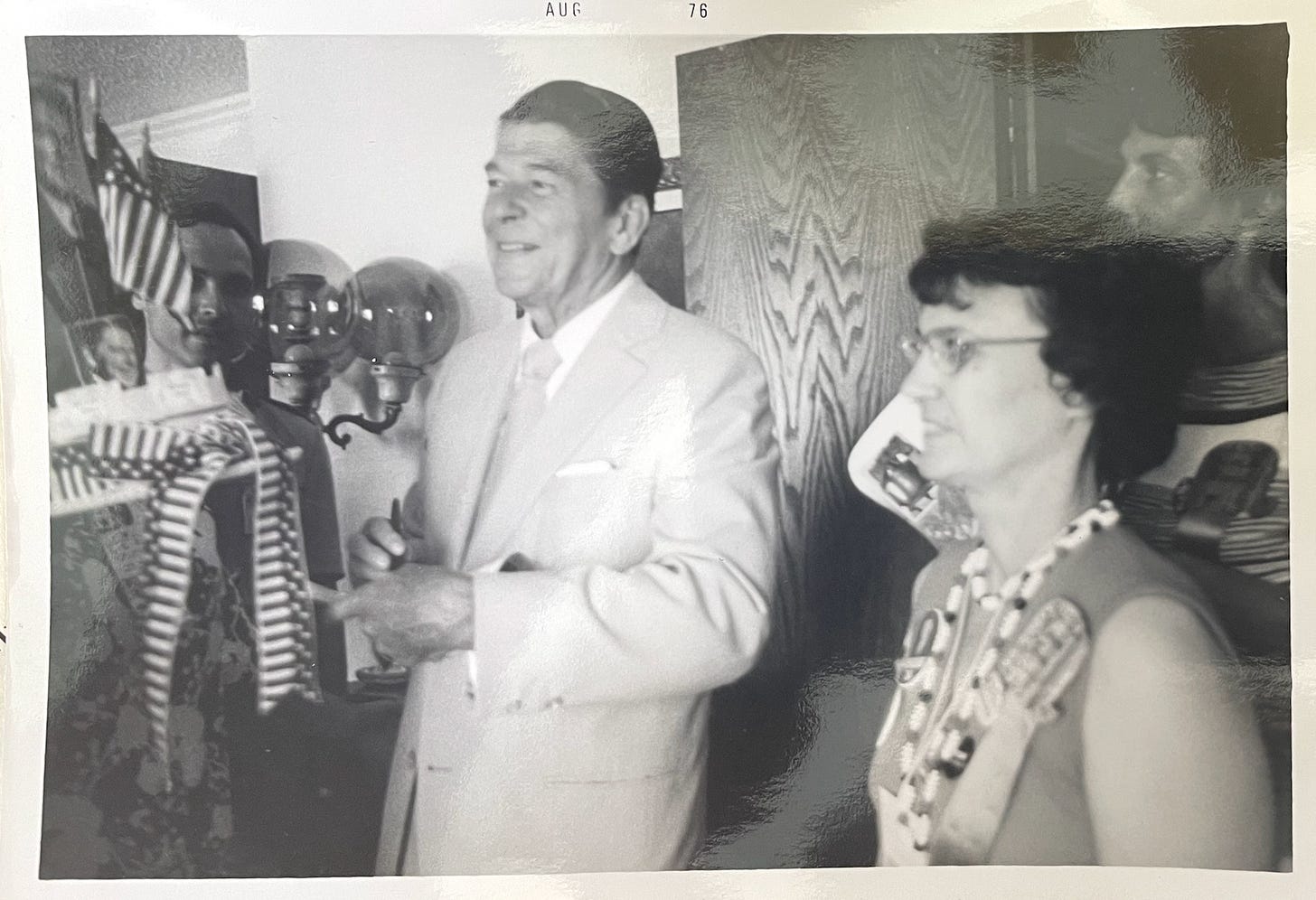
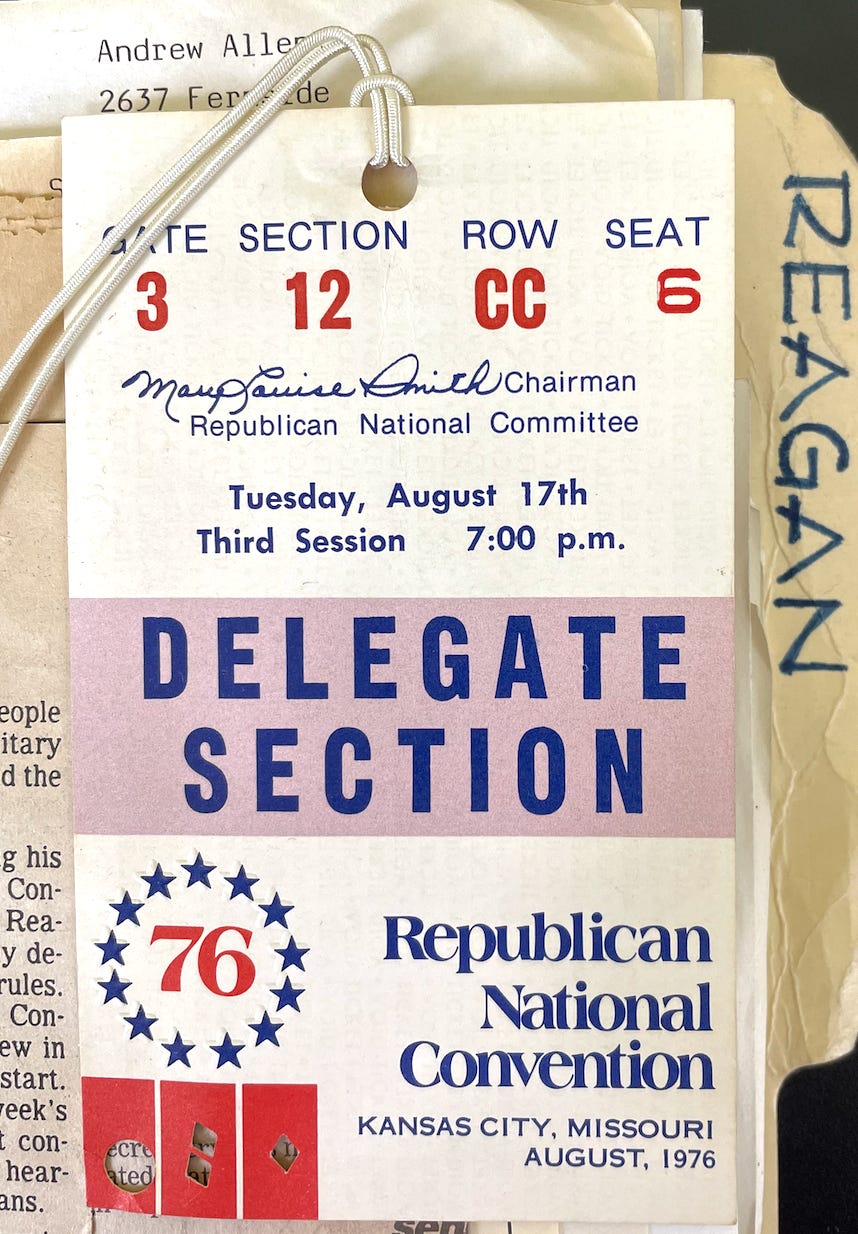
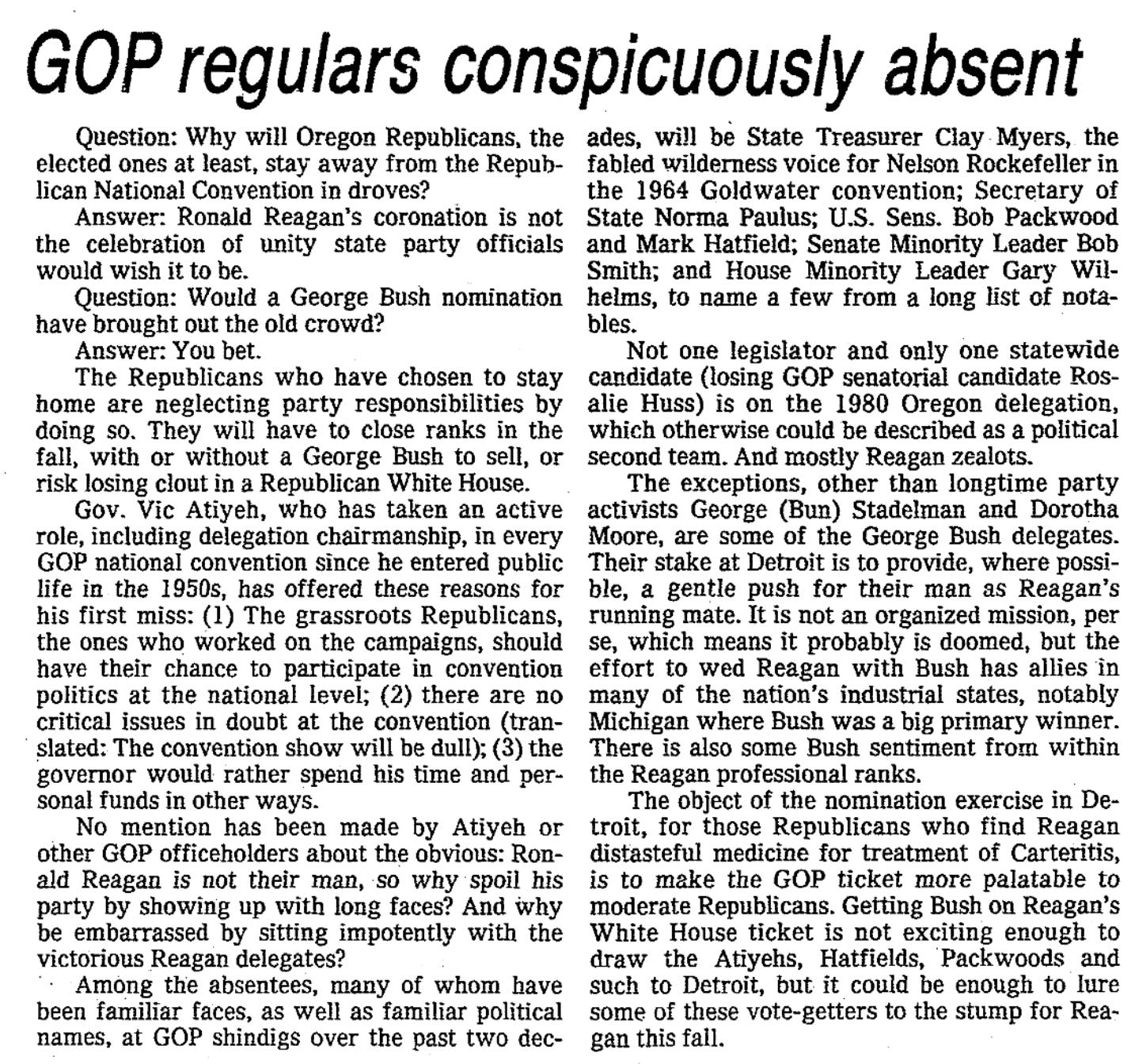
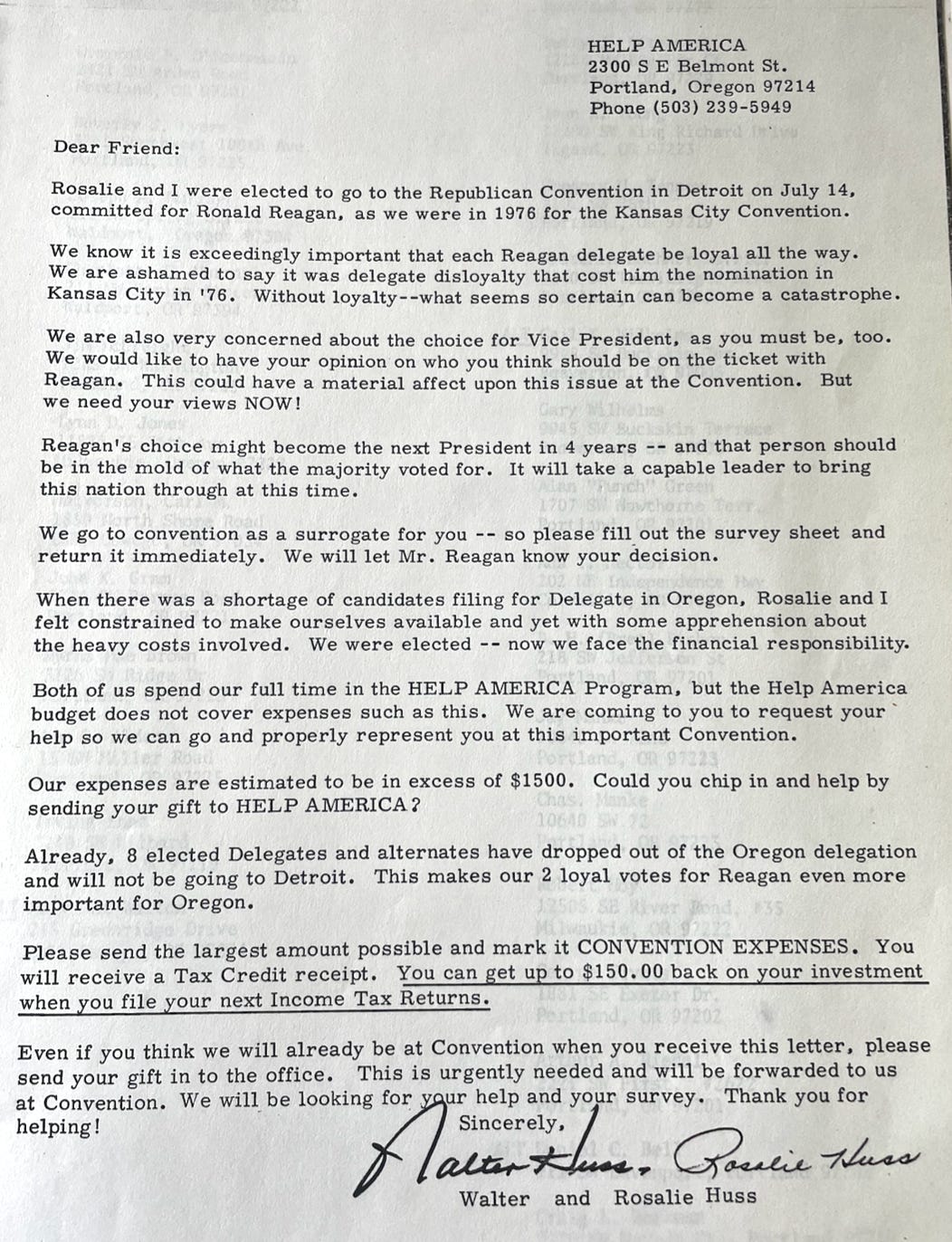
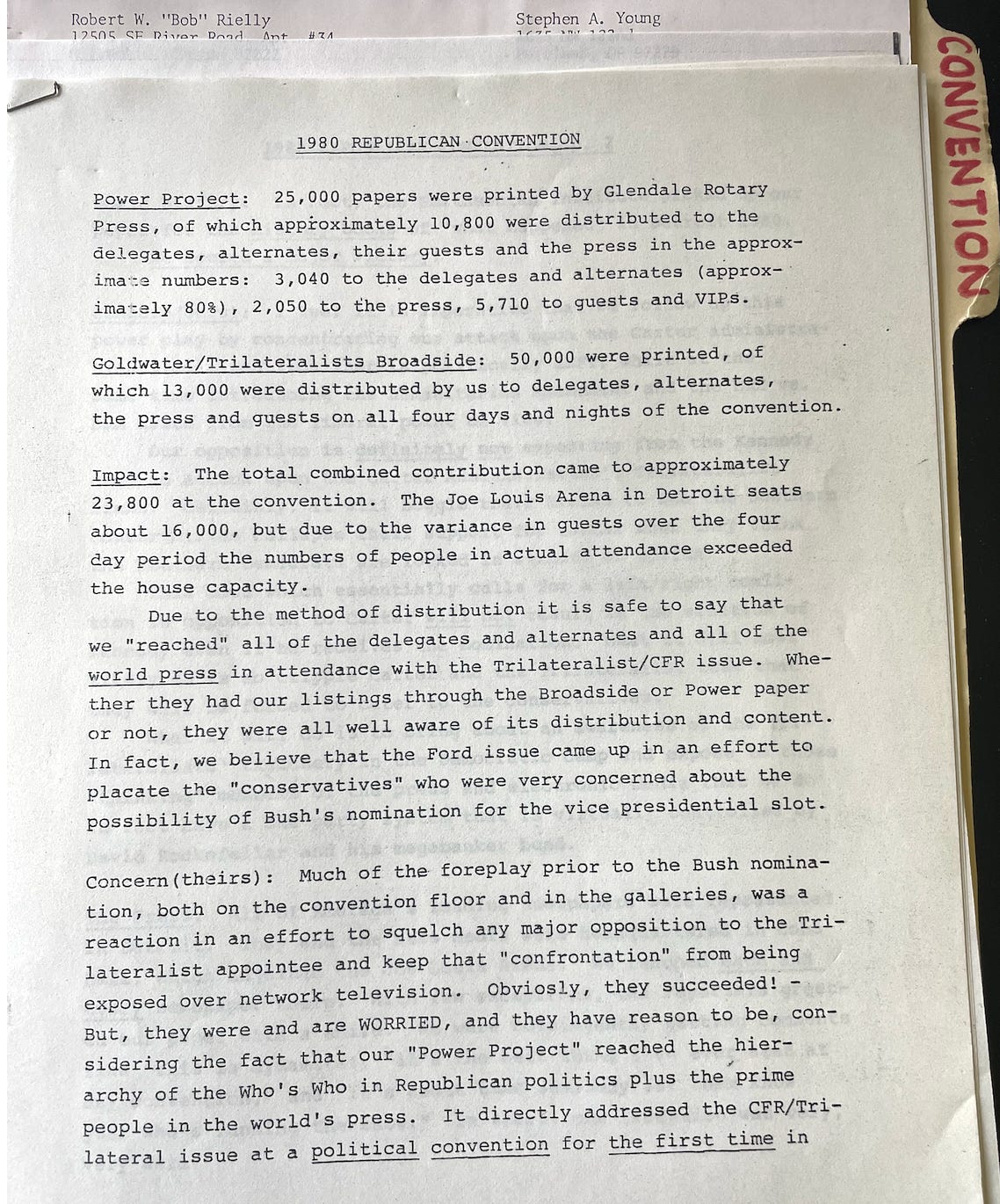
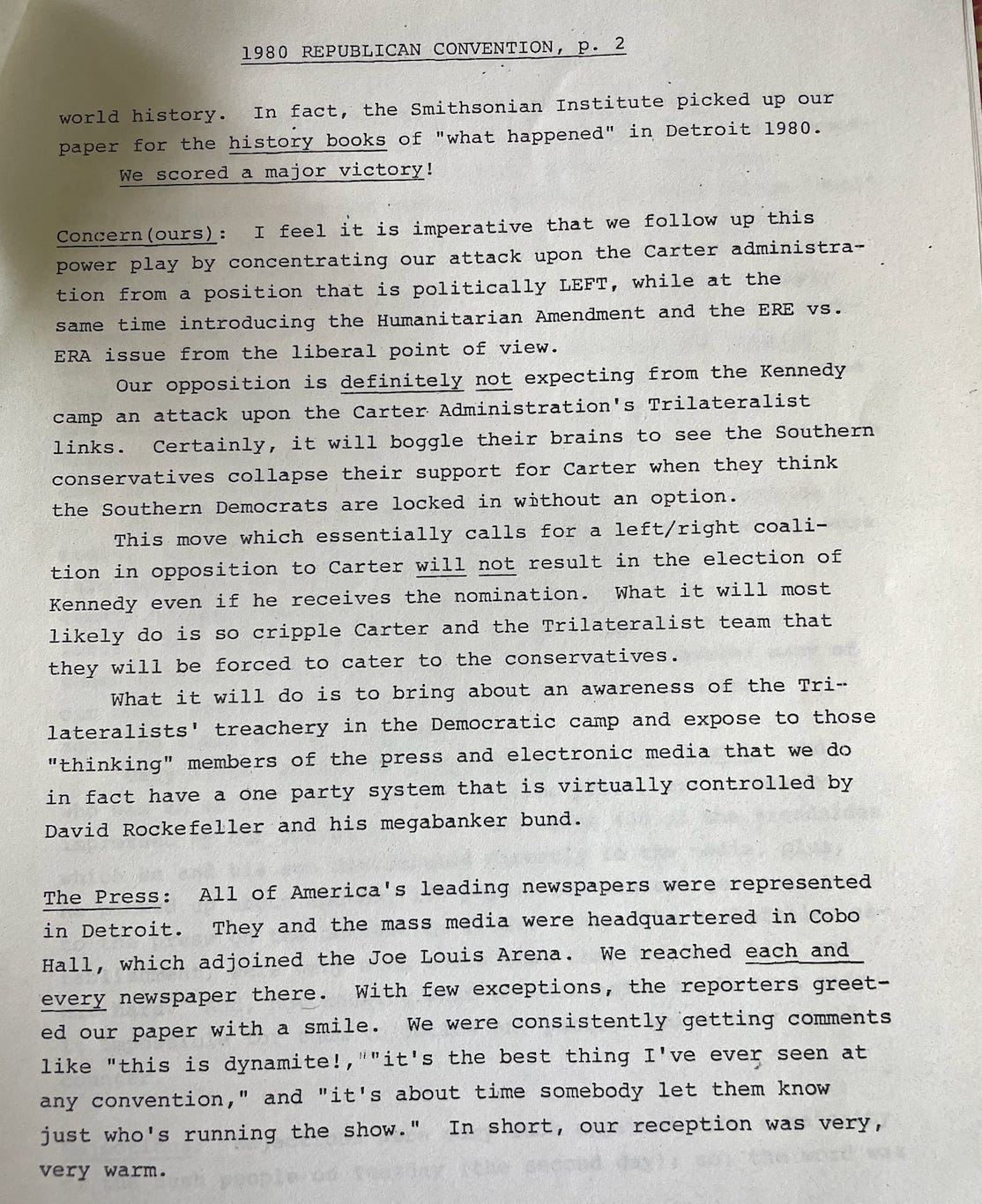
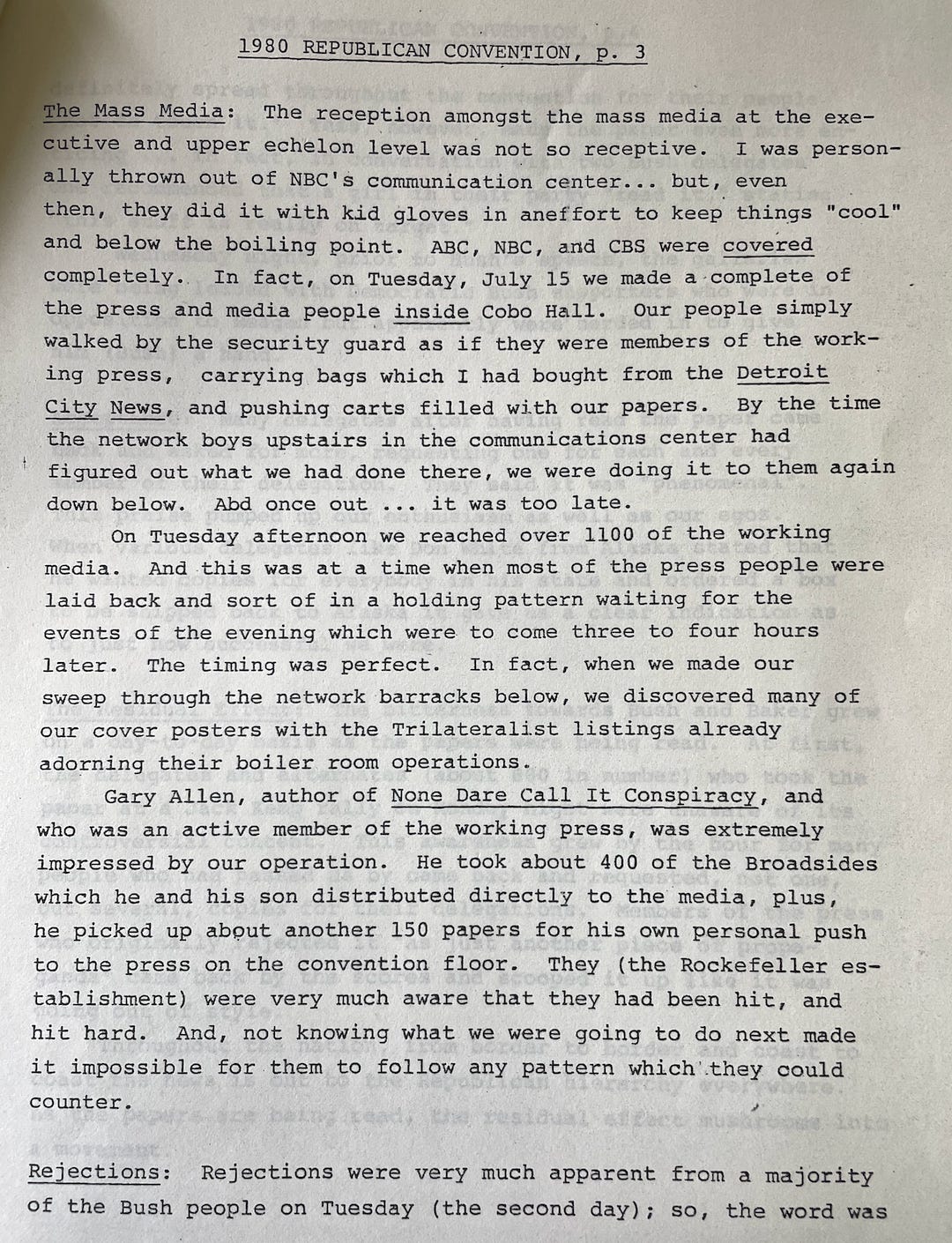
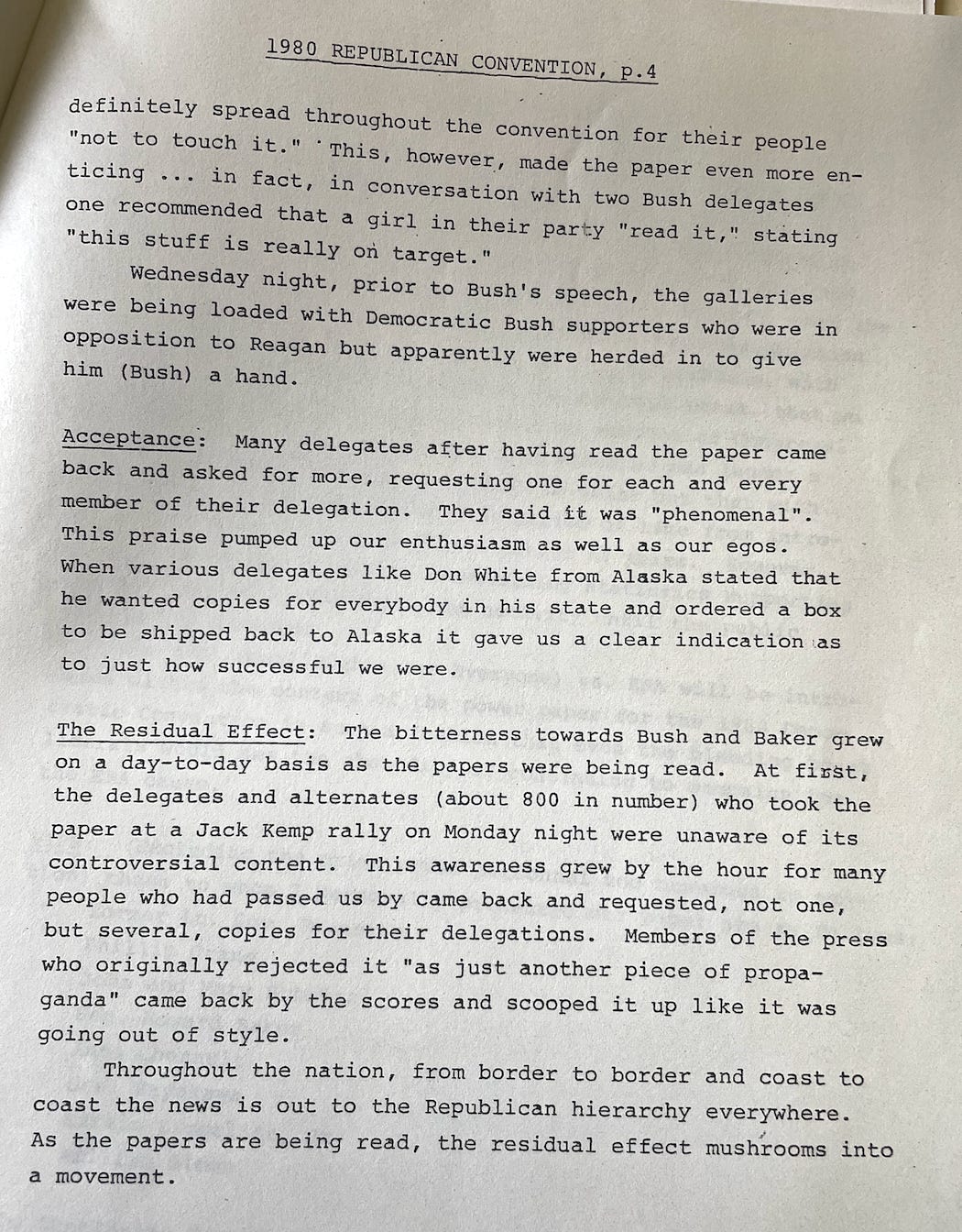
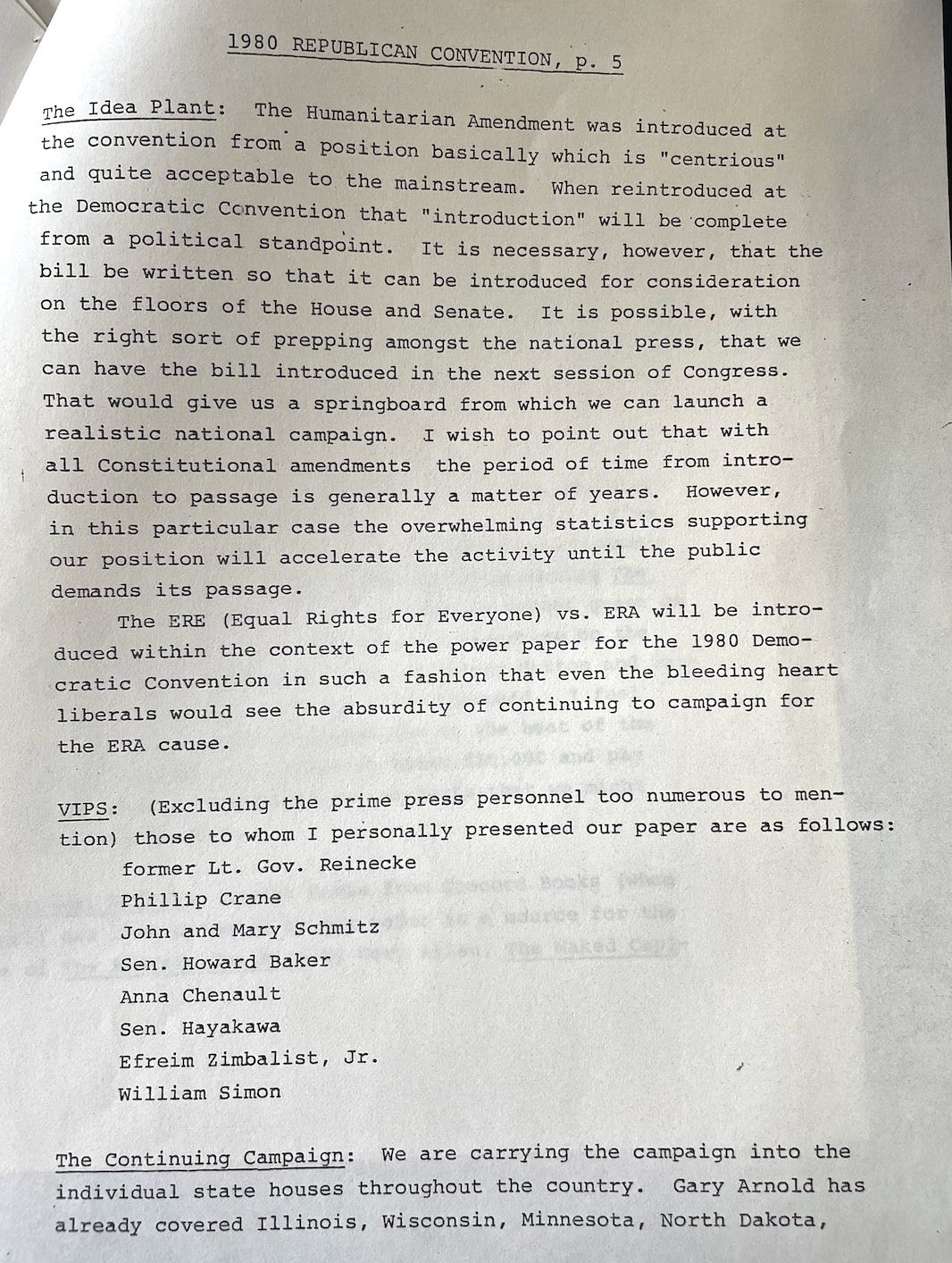
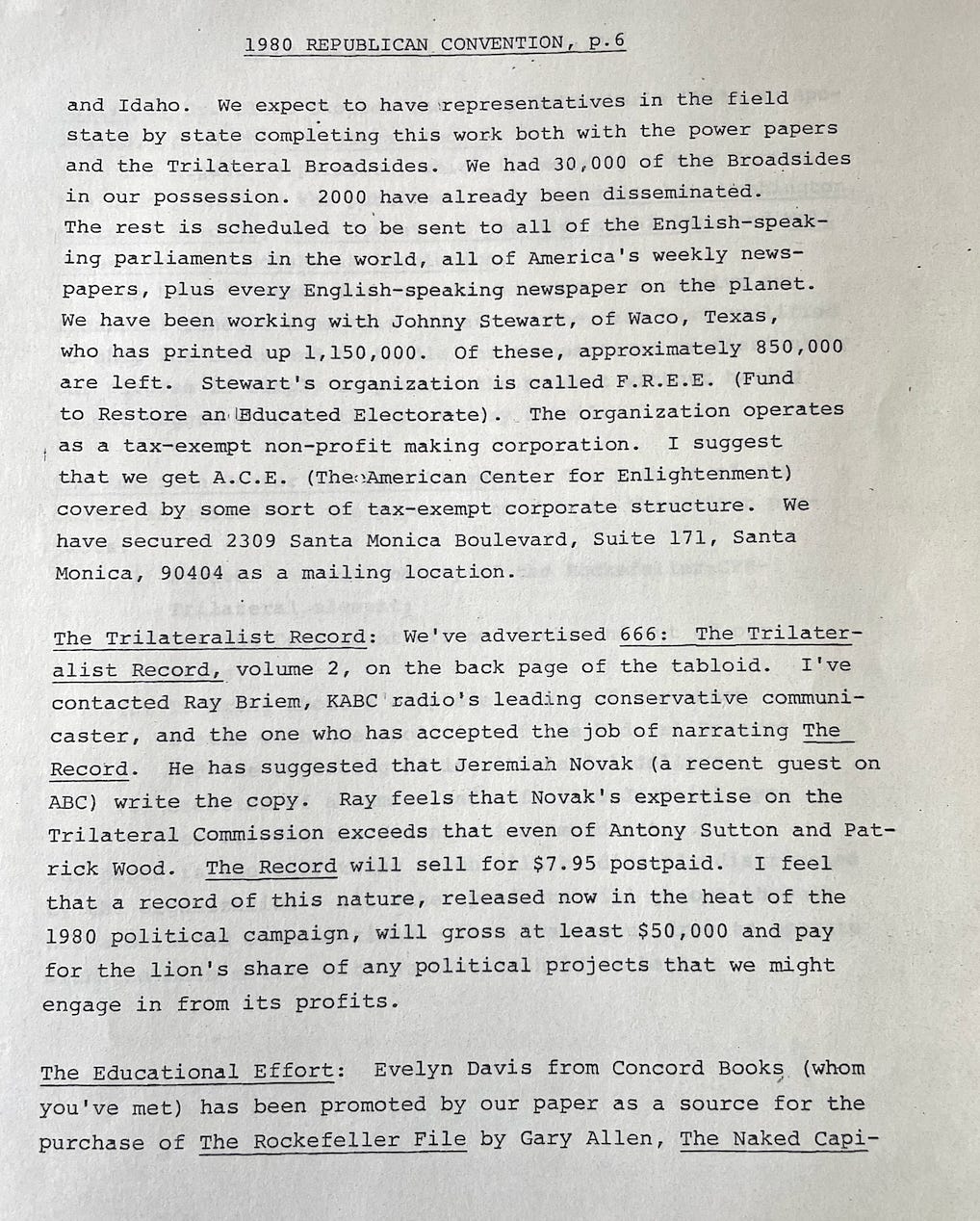
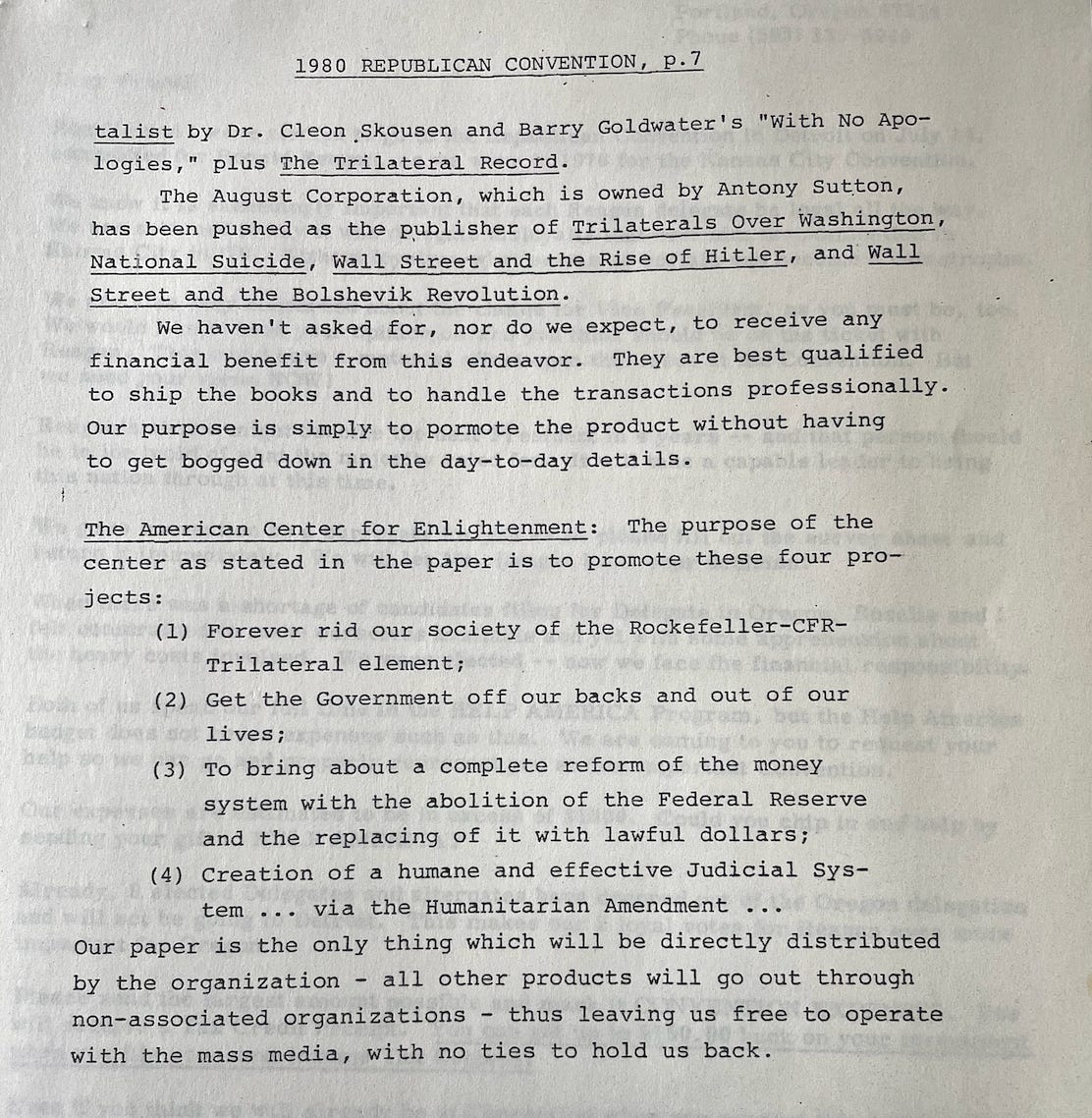
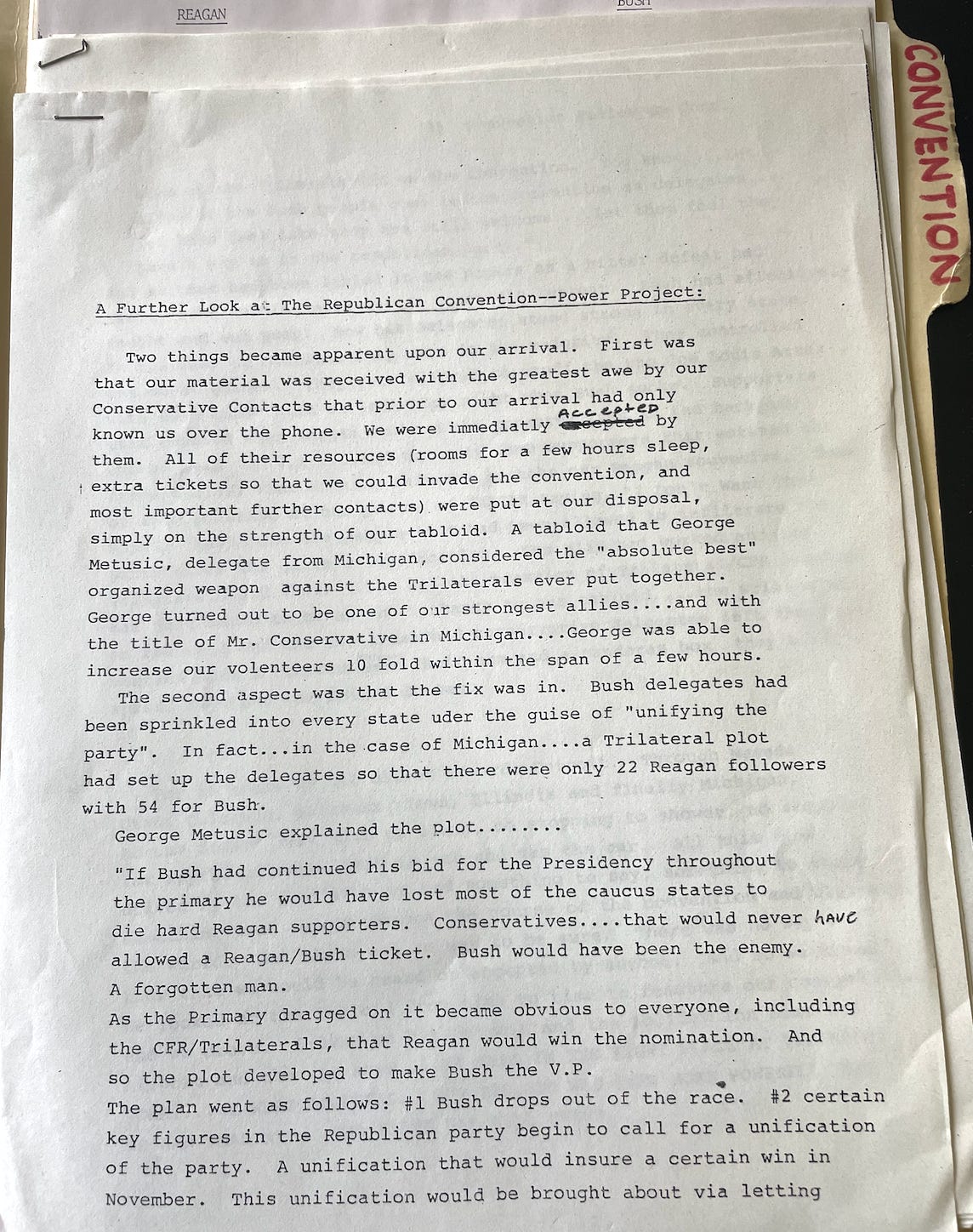
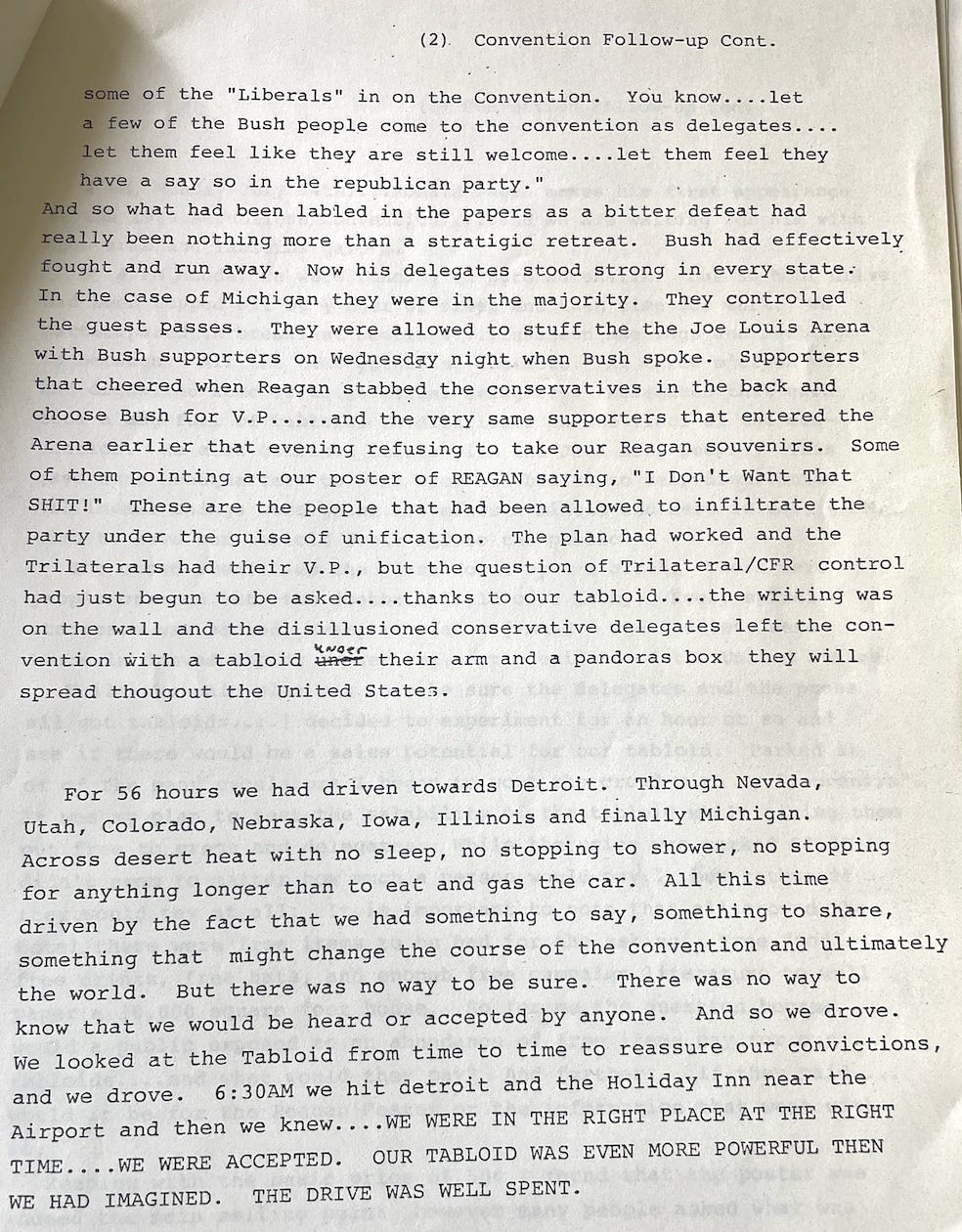
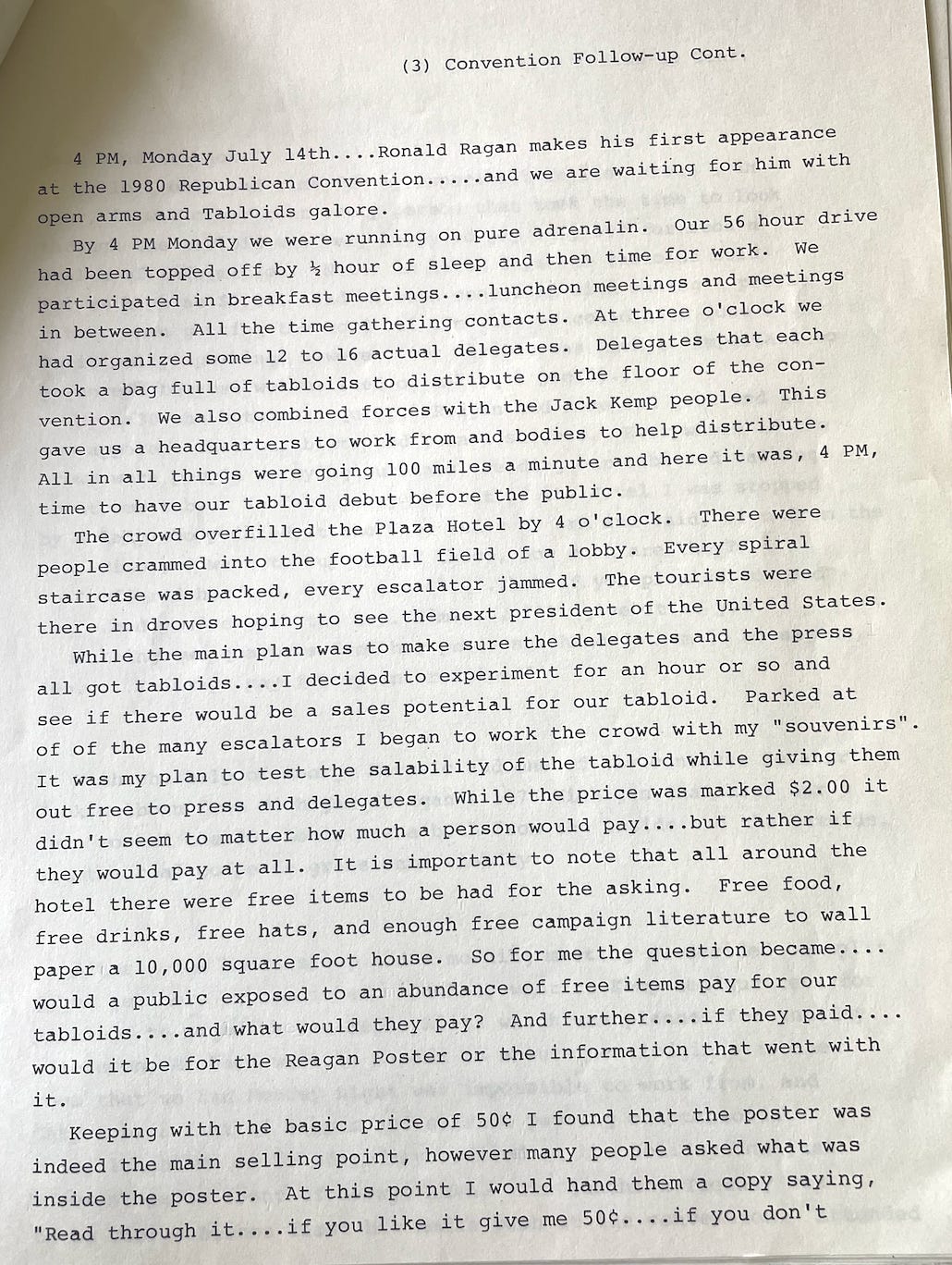
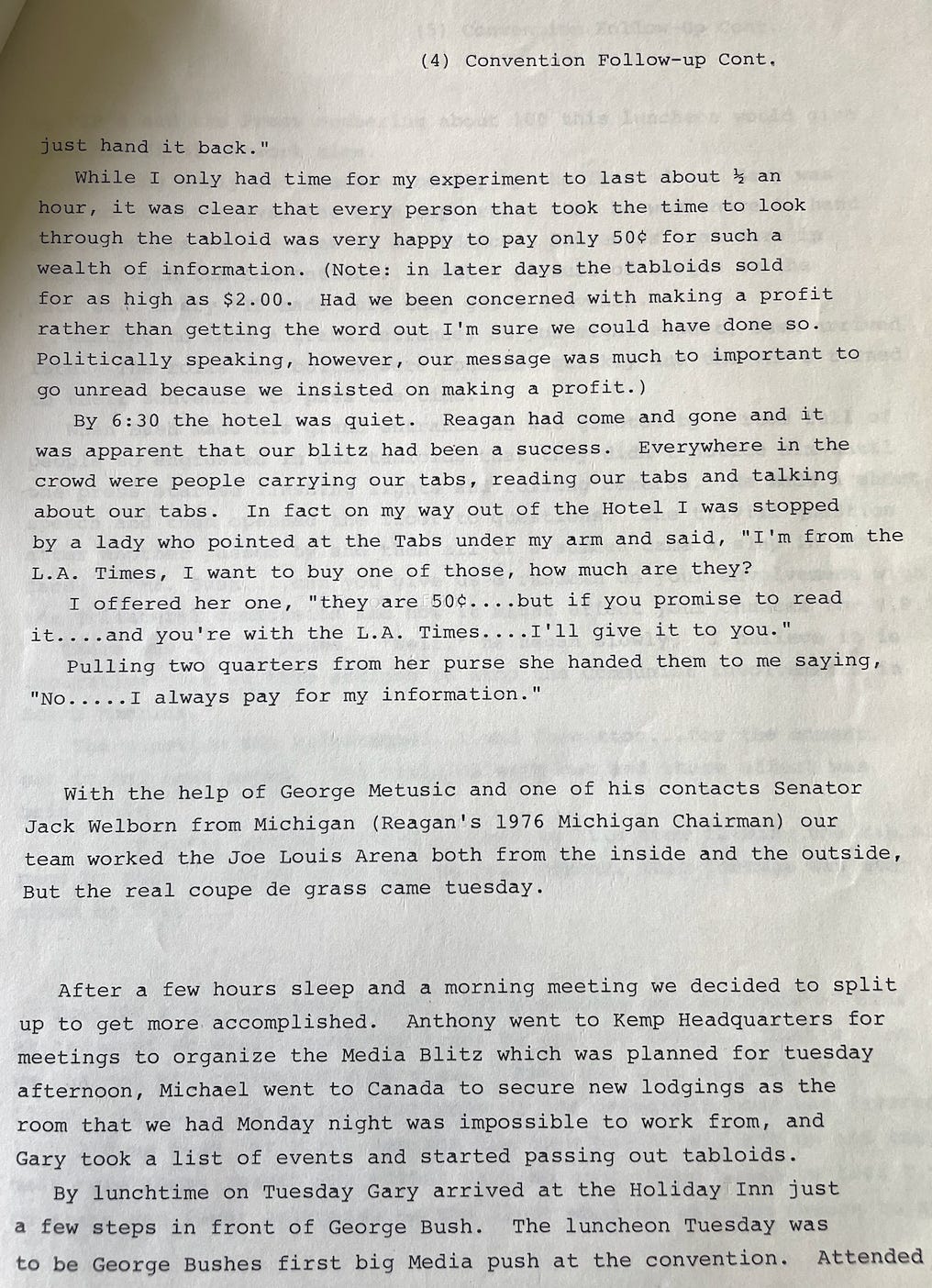
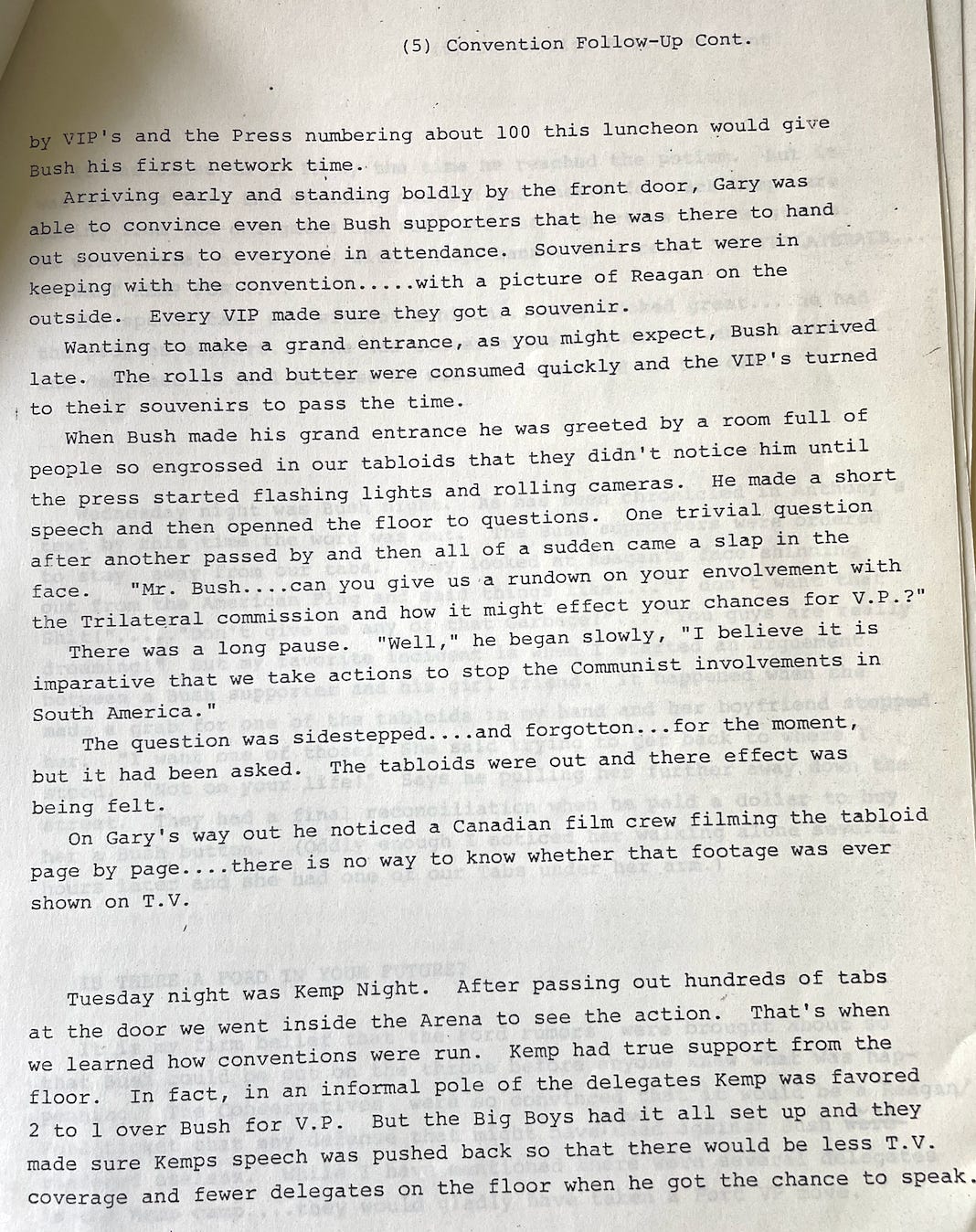
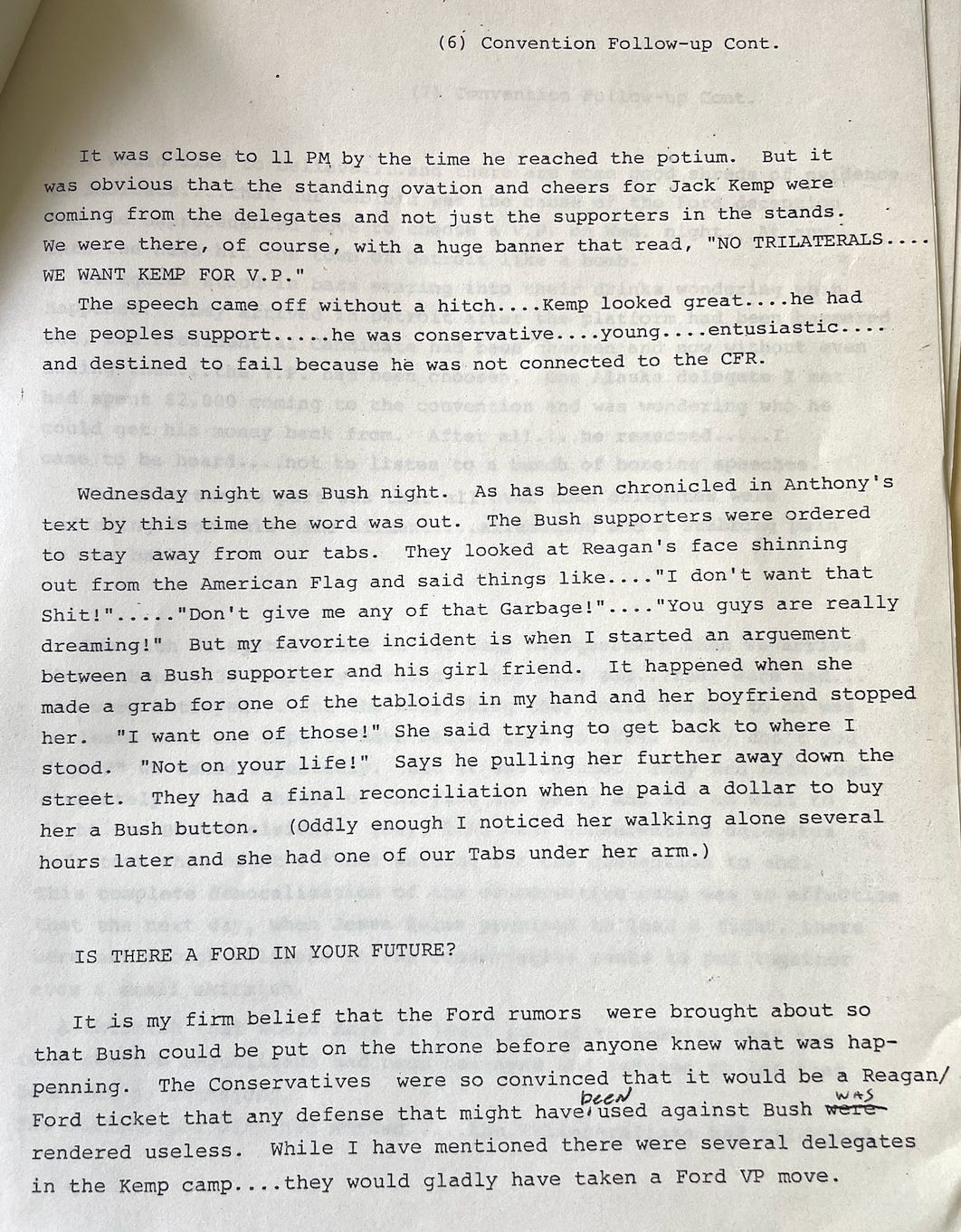

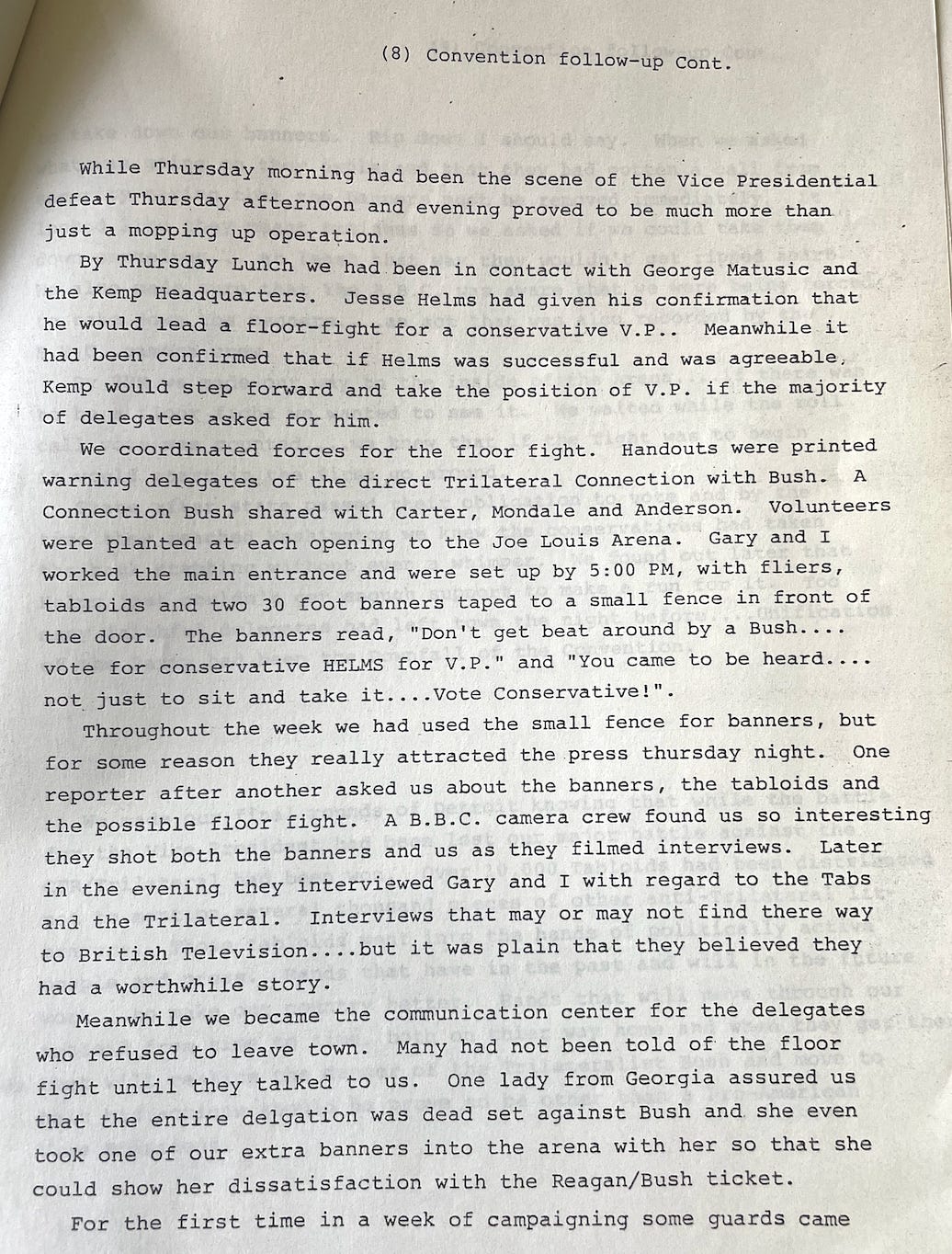
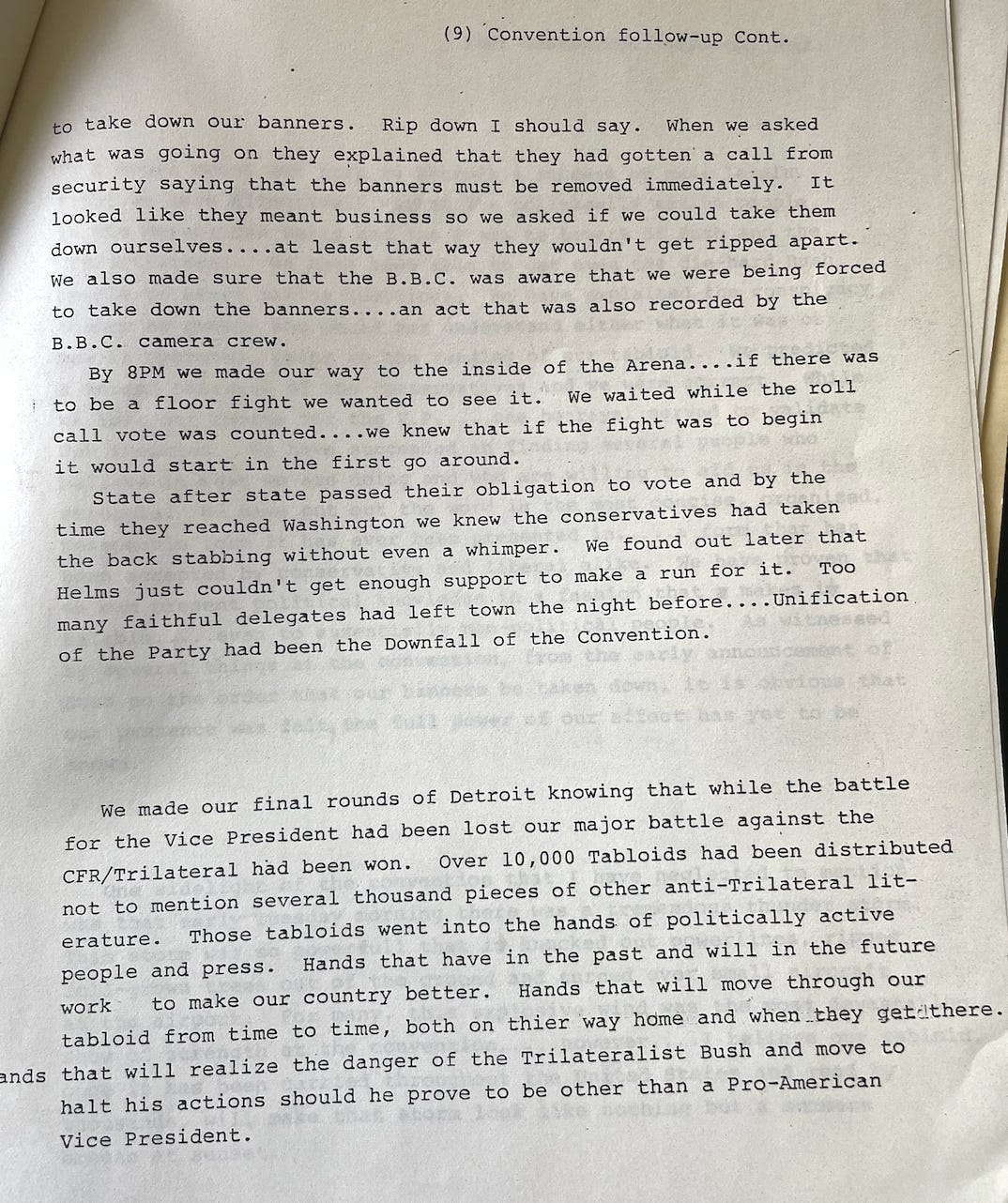
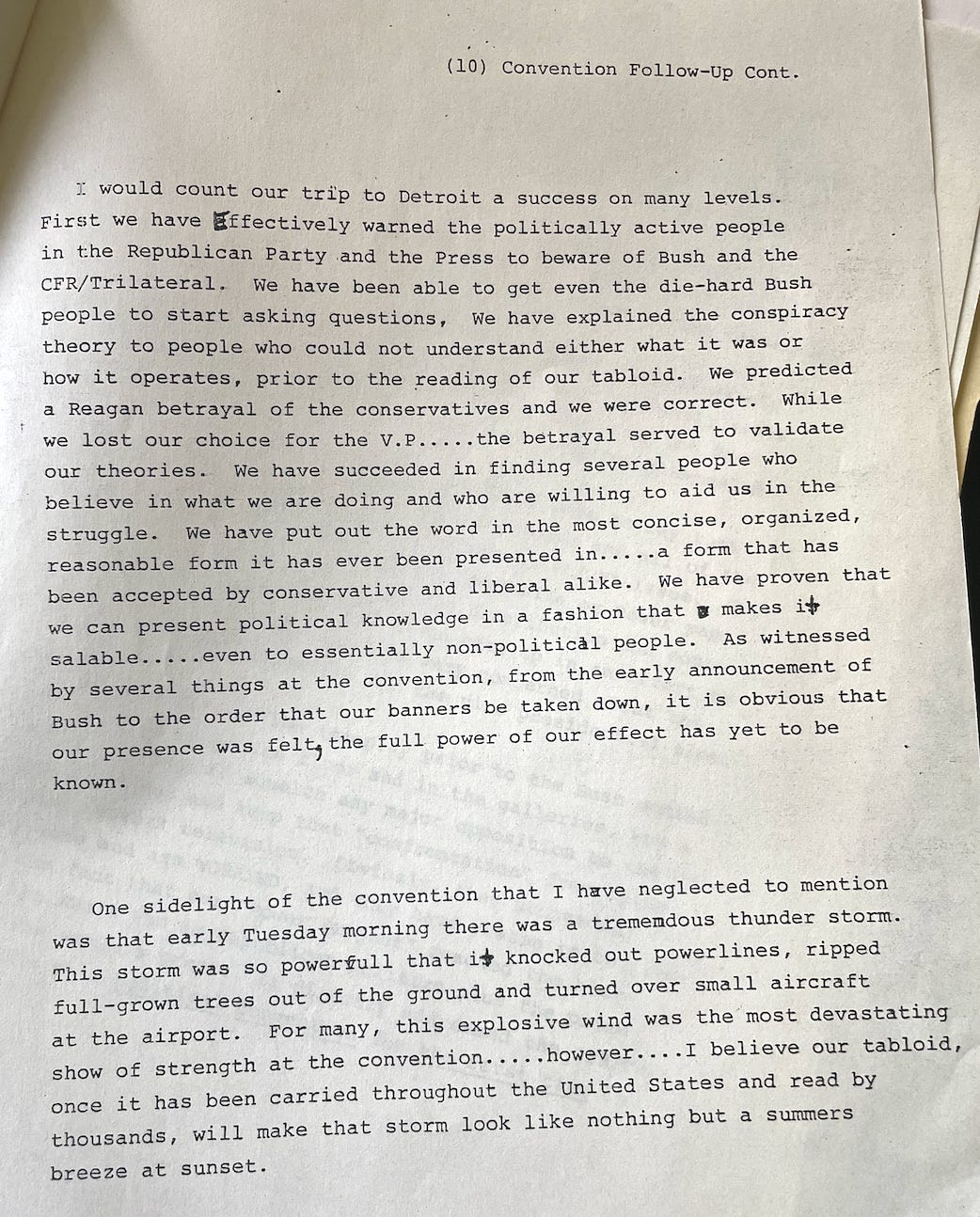
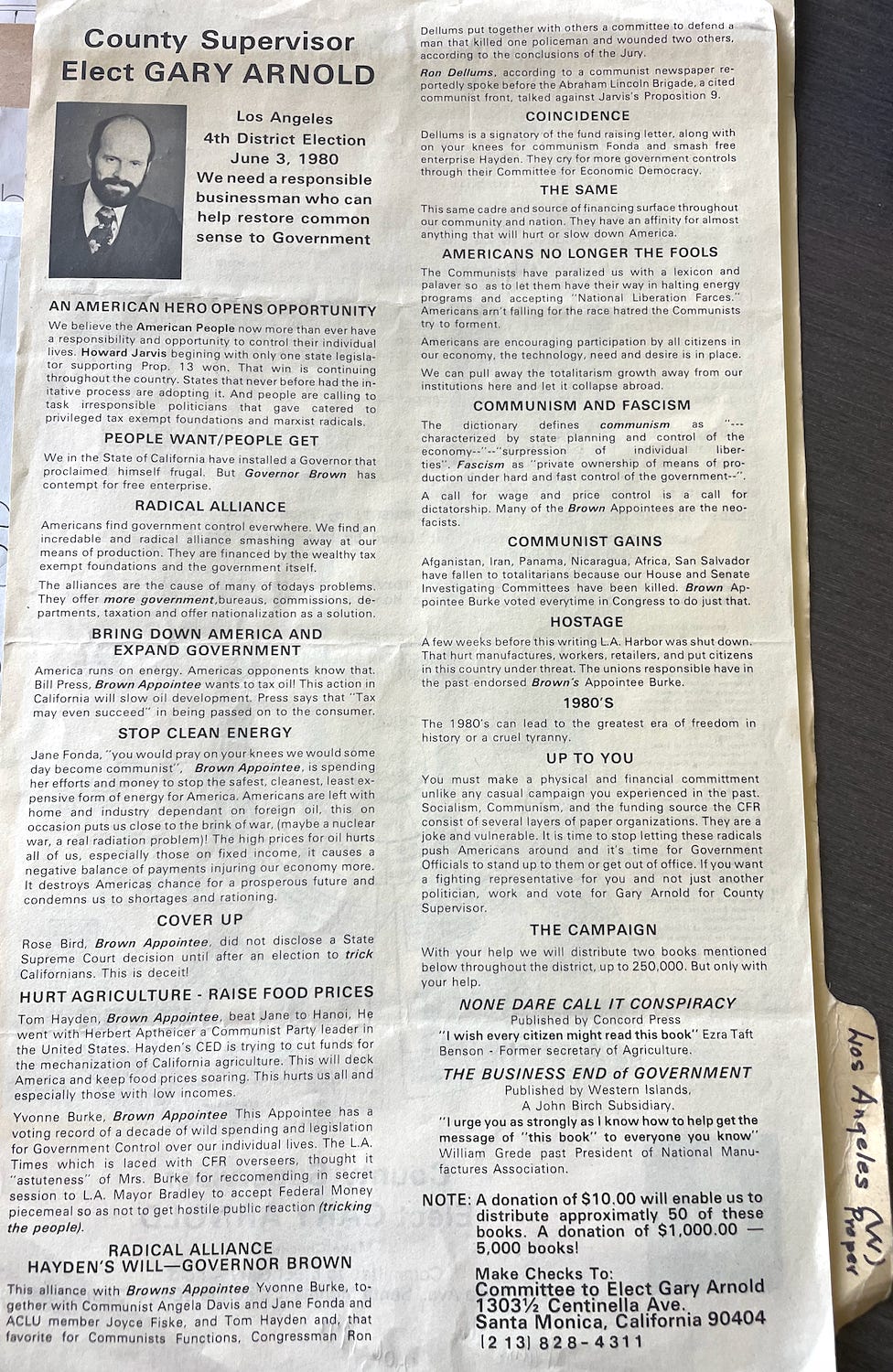

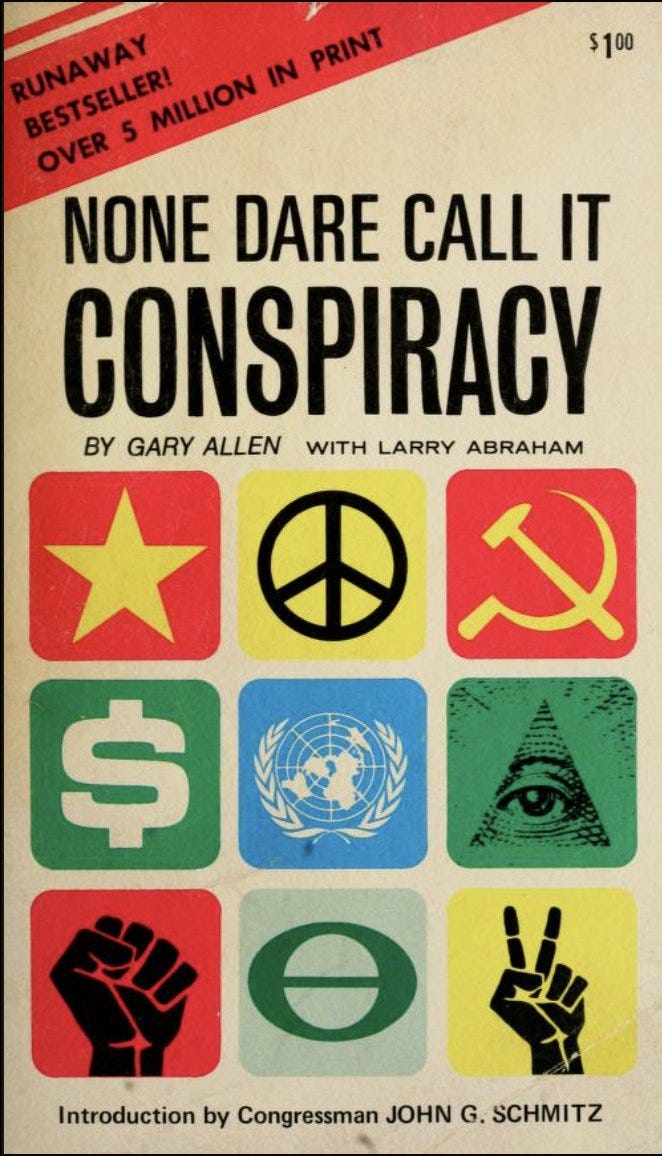
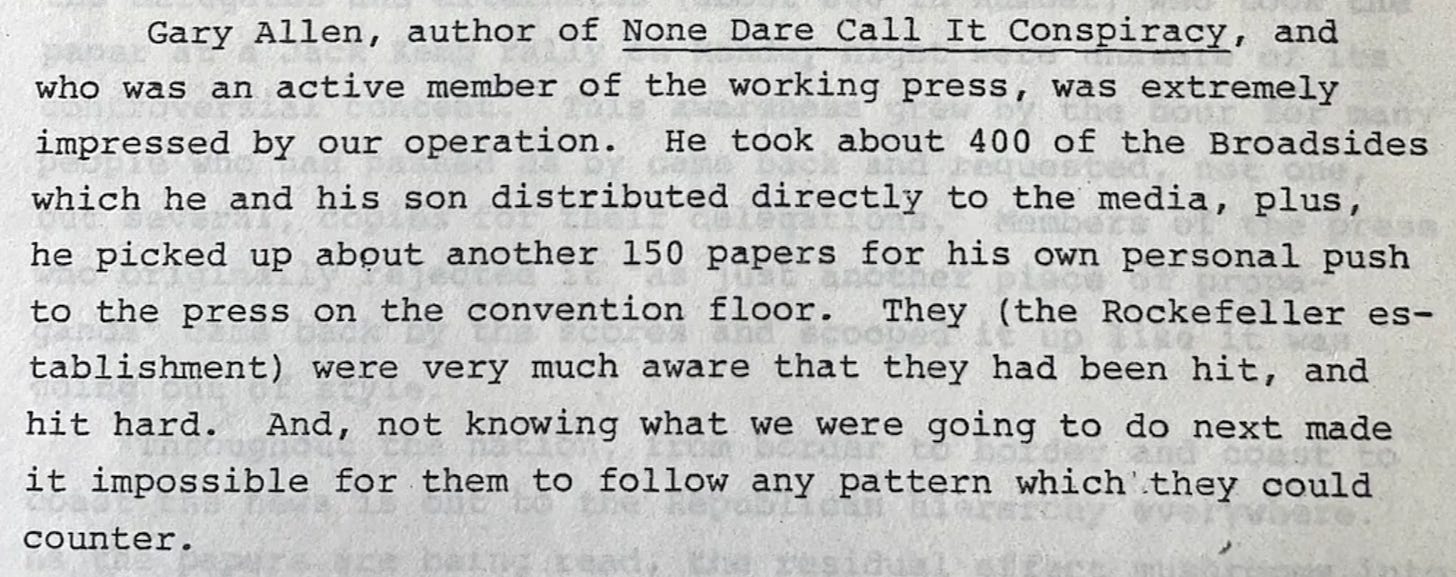
Fascinating, and frightening!
I won’t judge him by his father’s insanity, but Politico/Axios founder Mike Allen’s origin story is the most interesting thing I’ve learned today. Thanks so much!